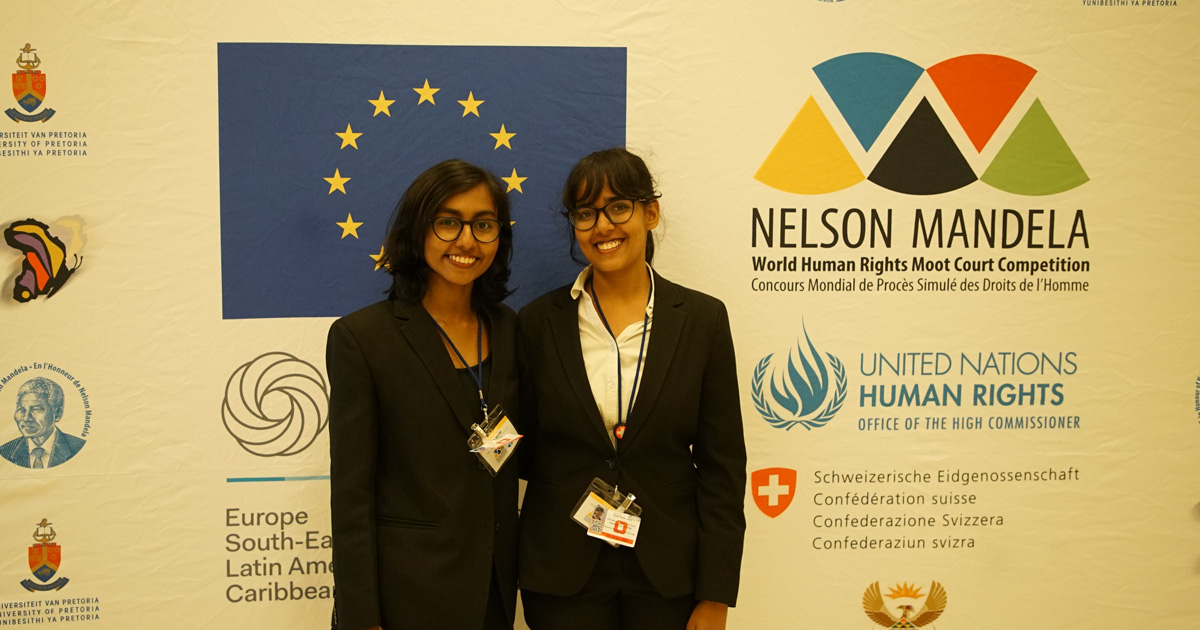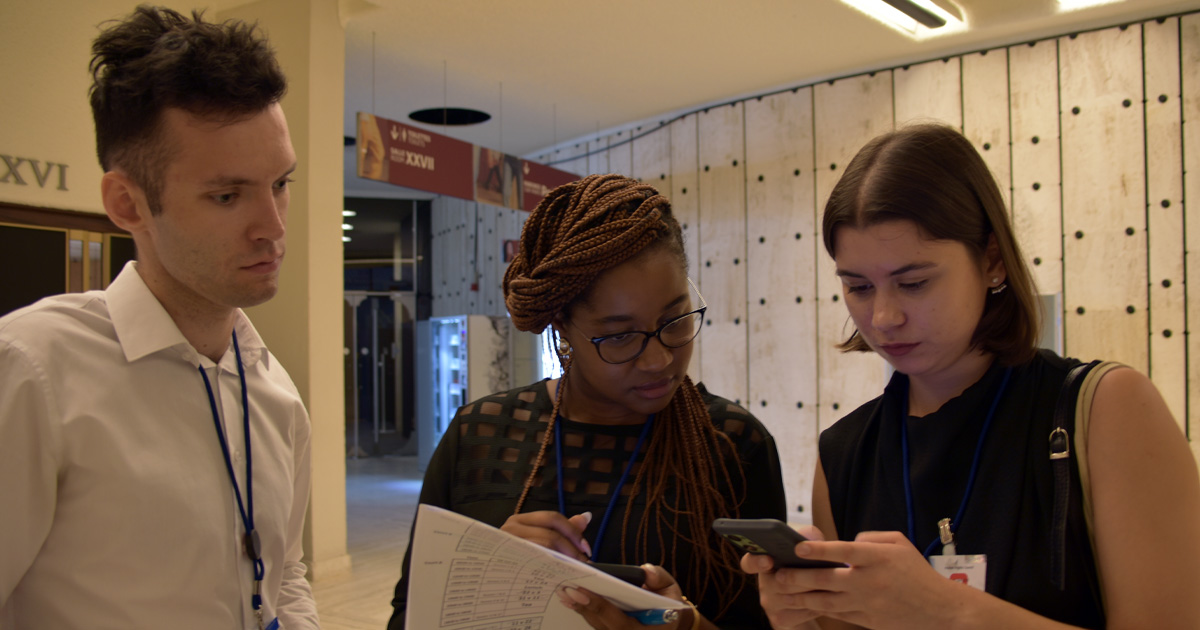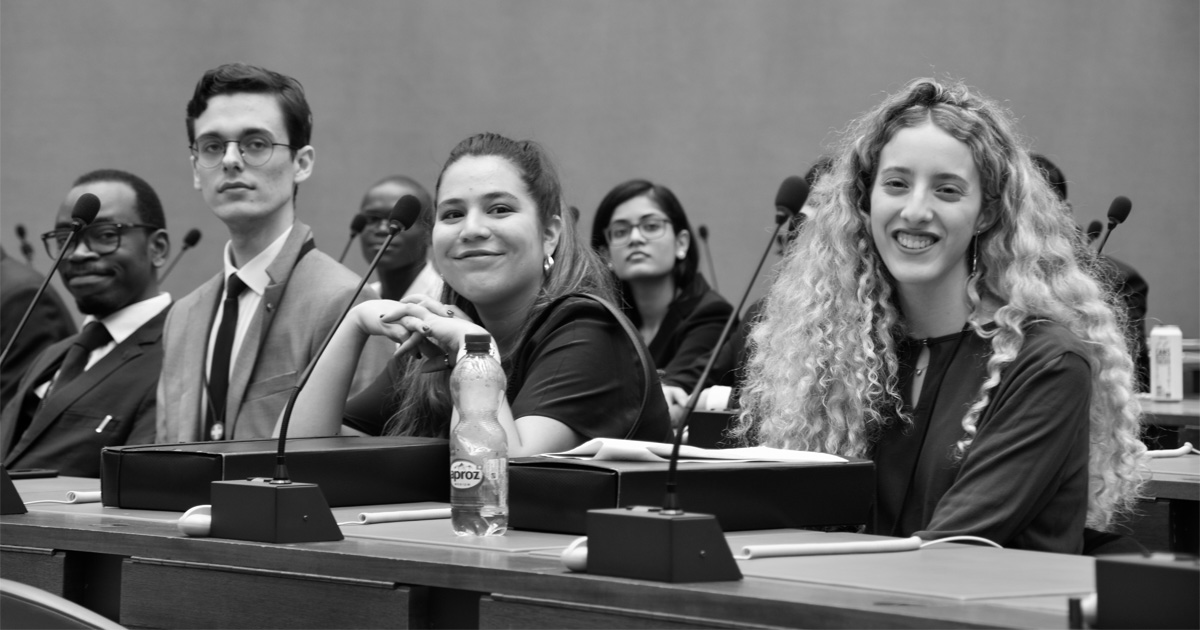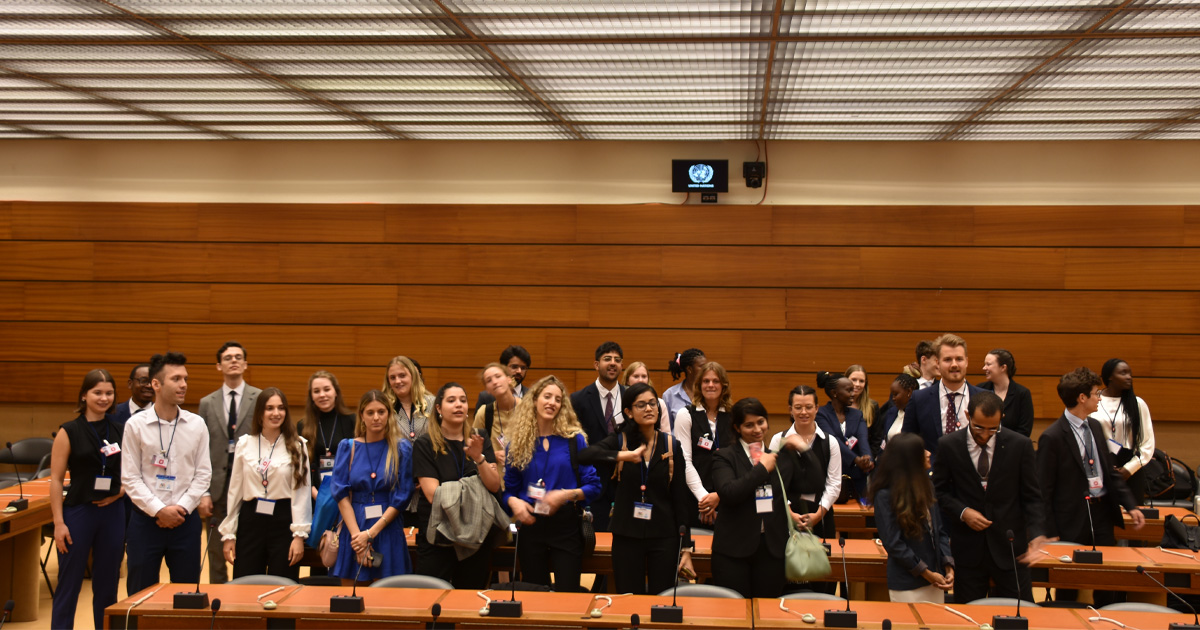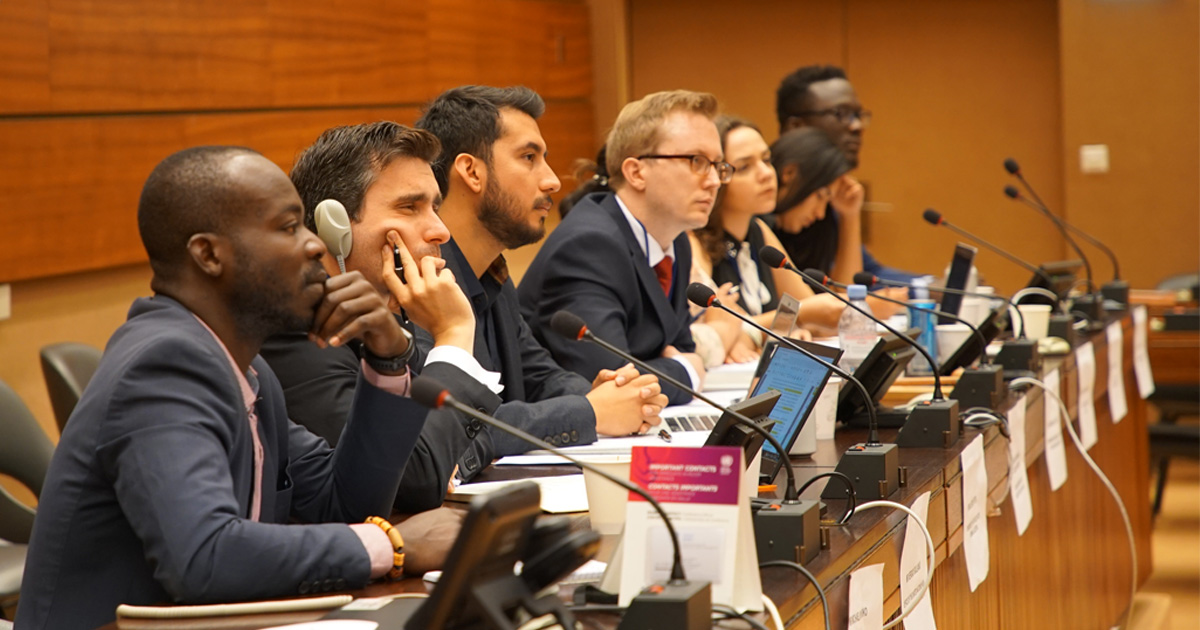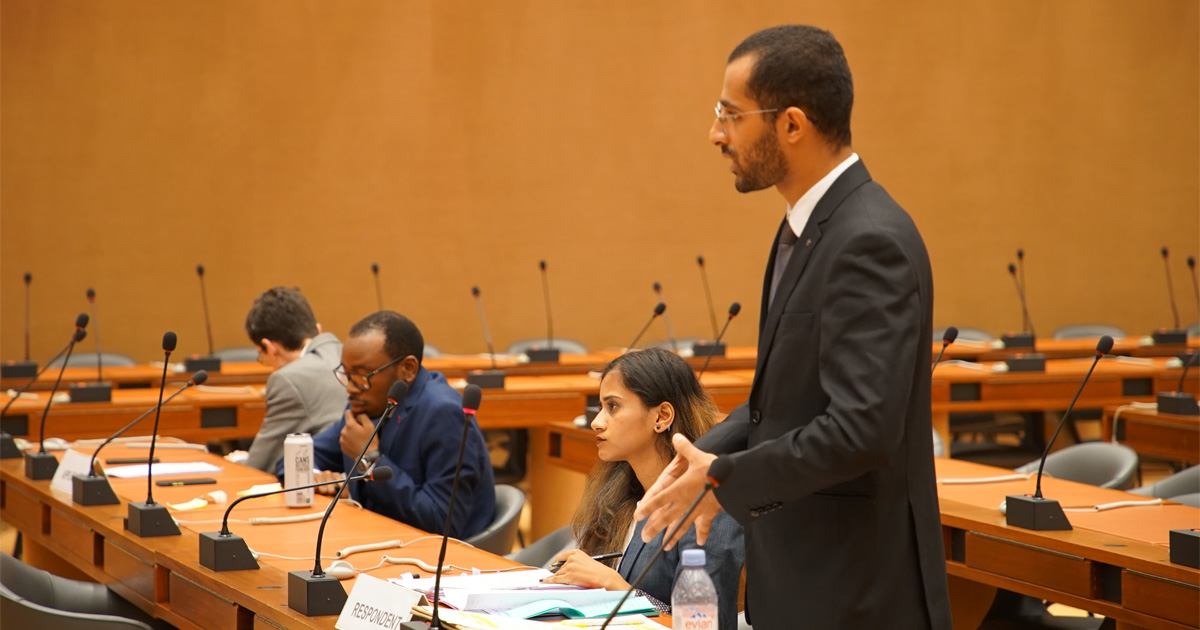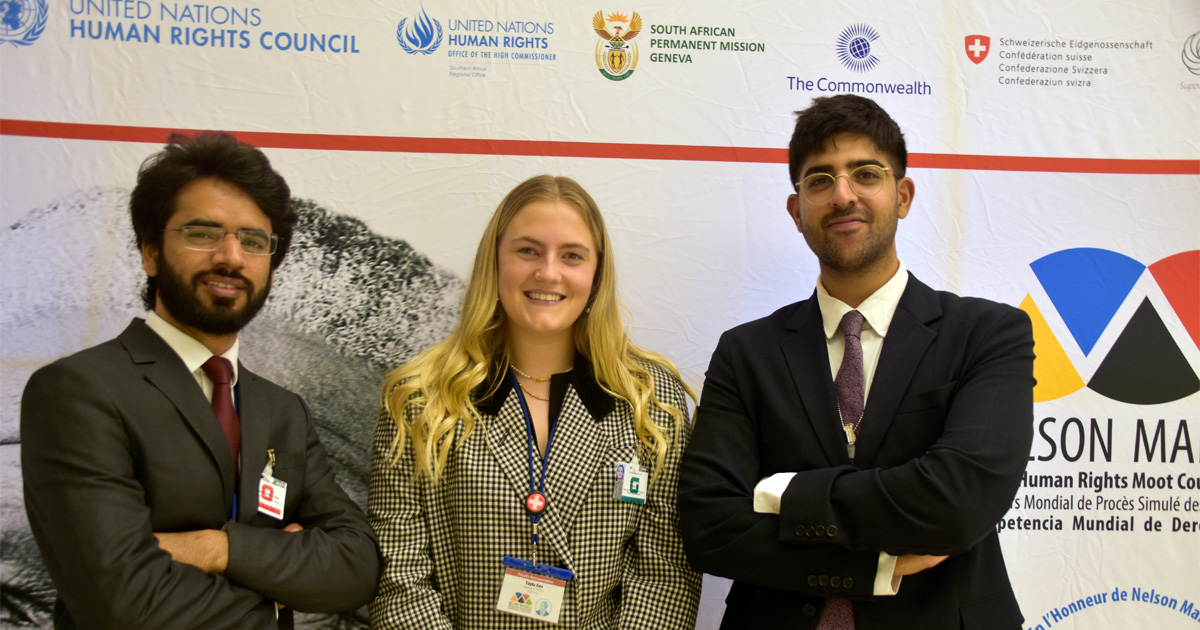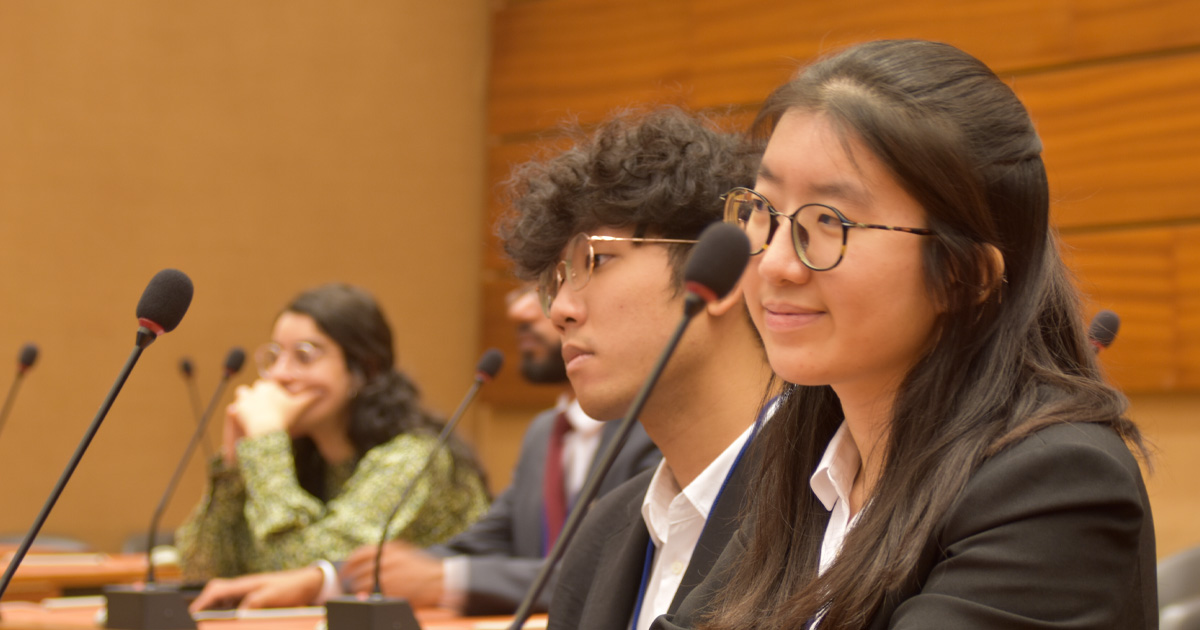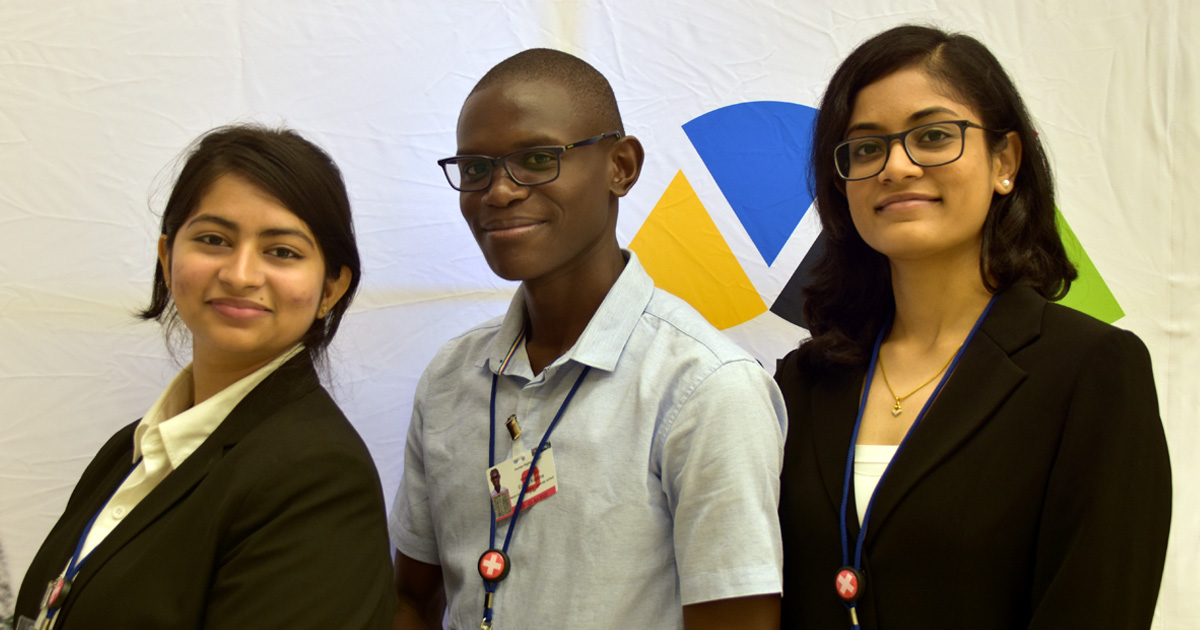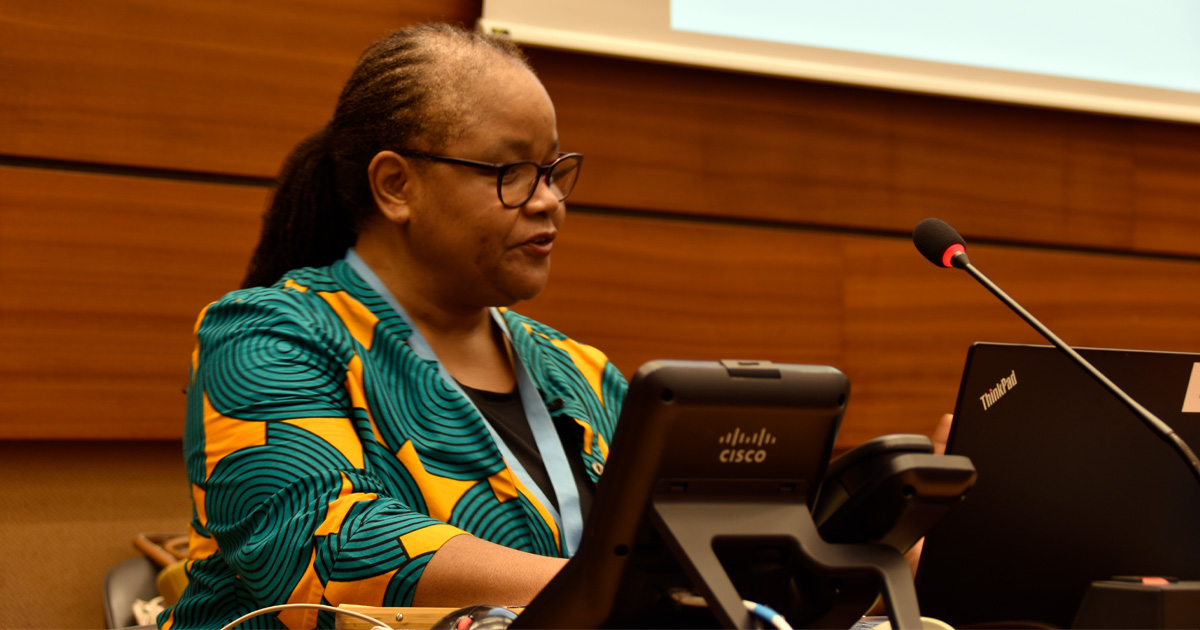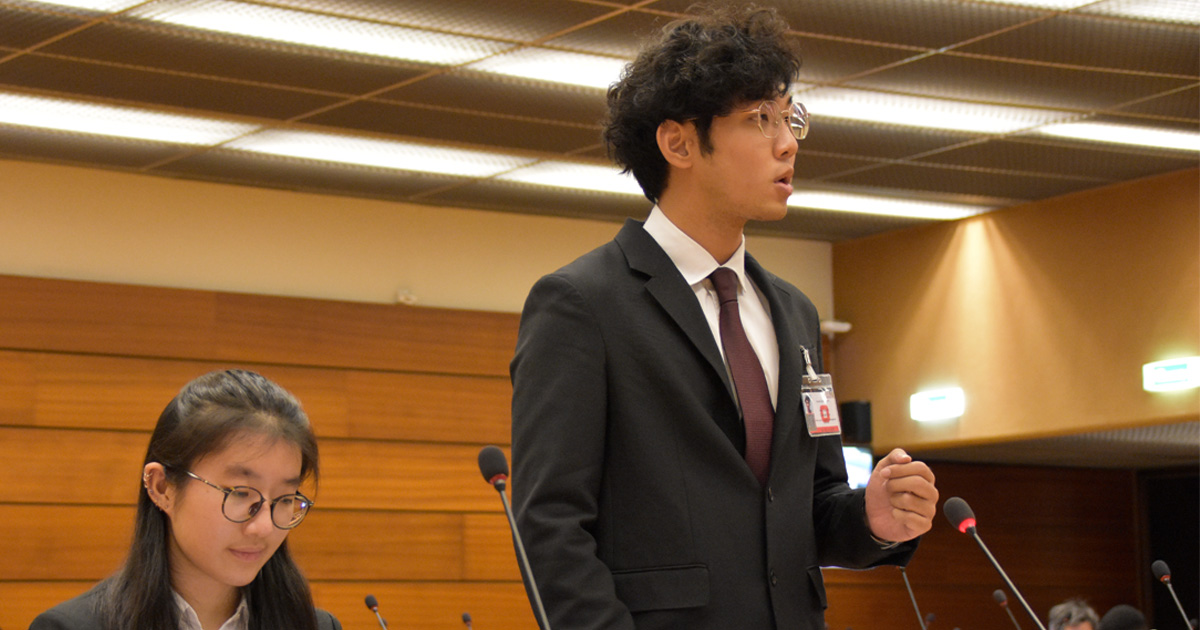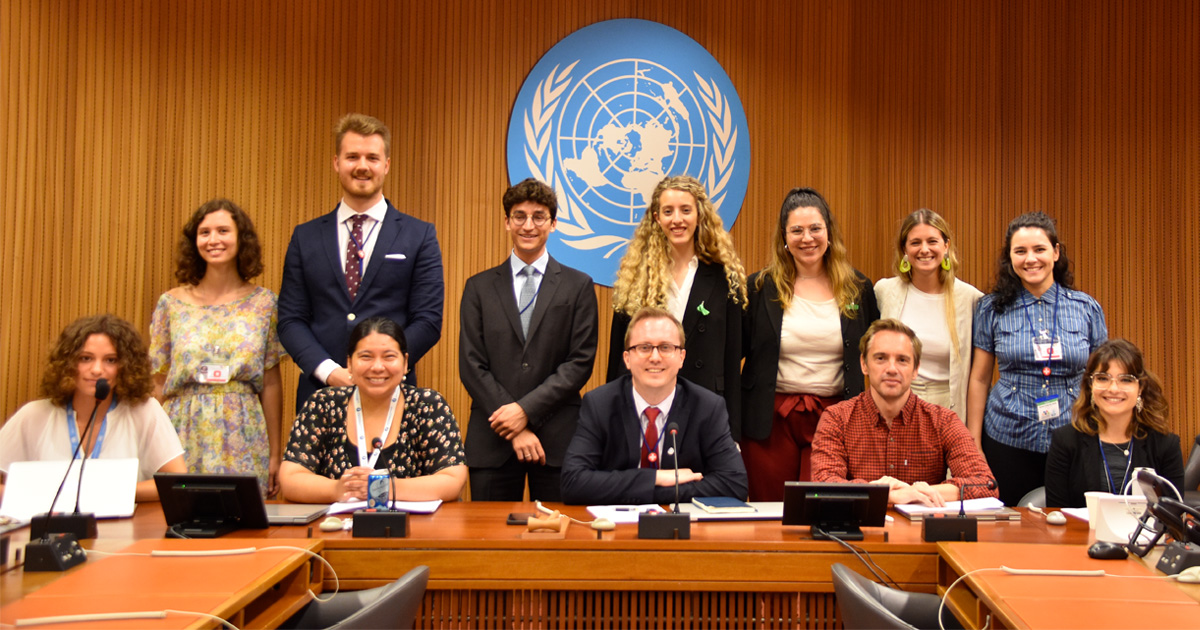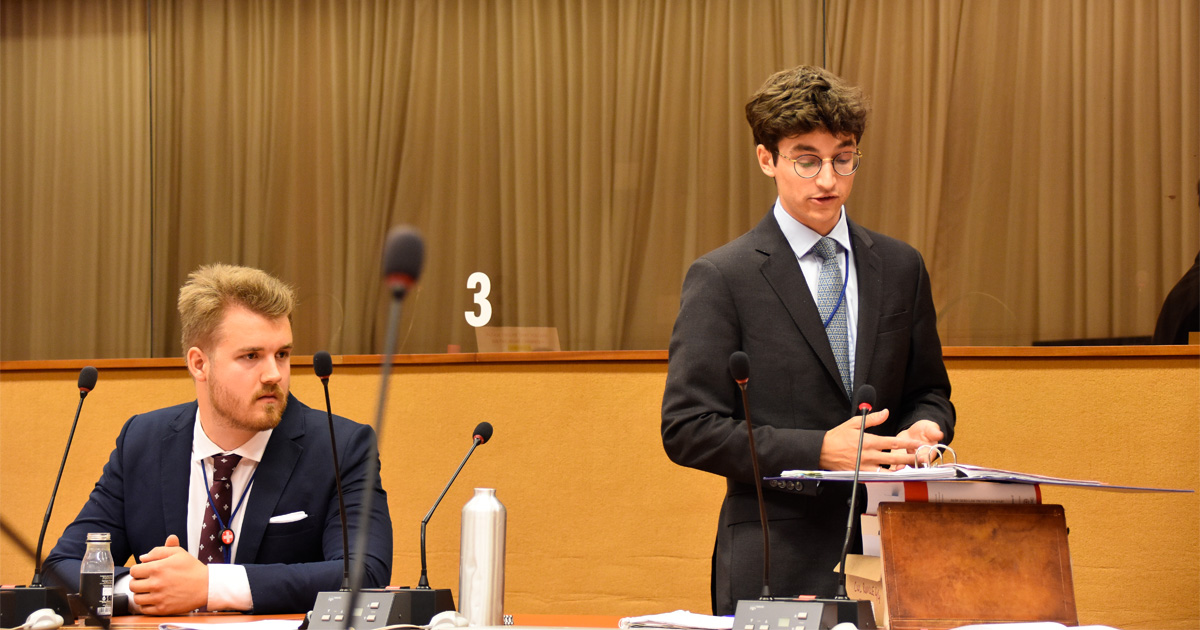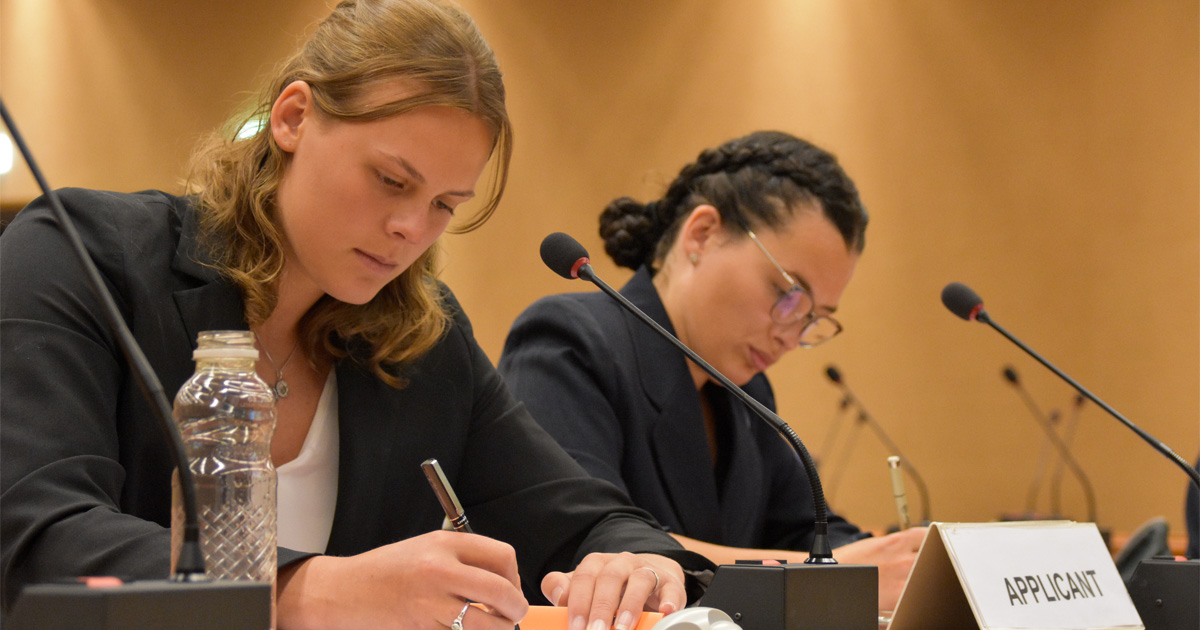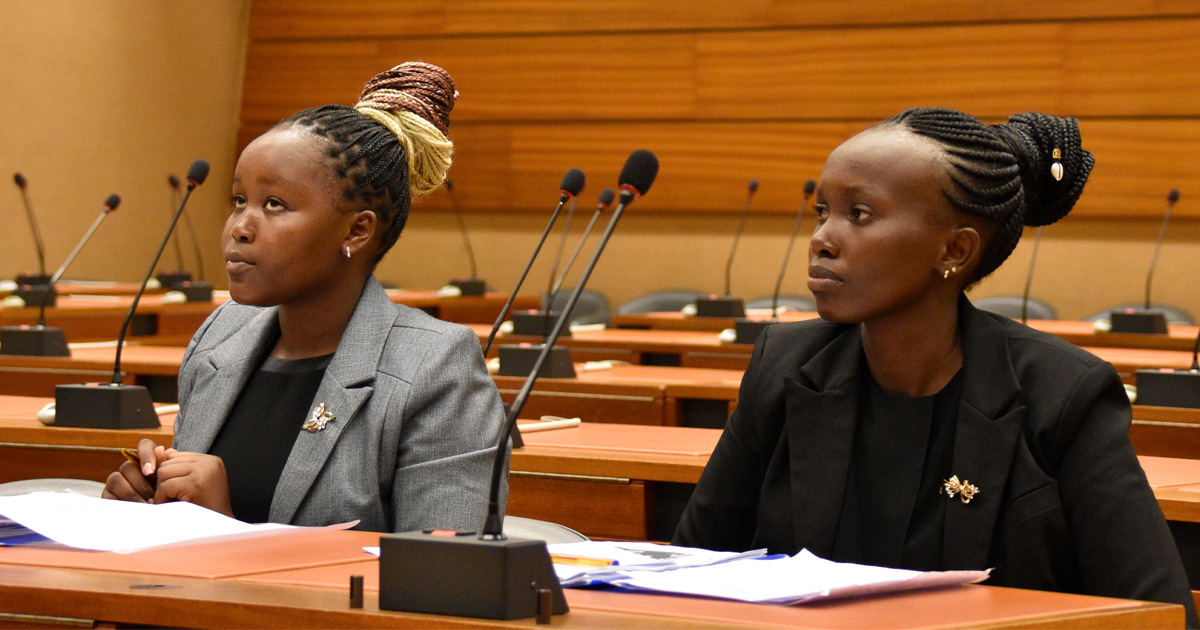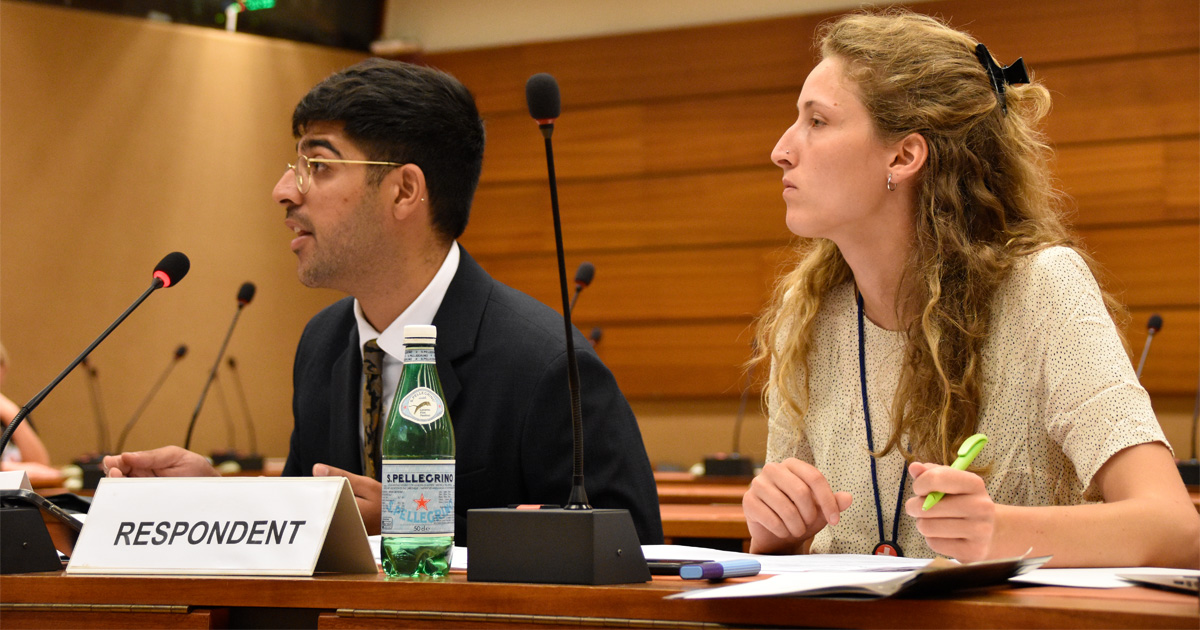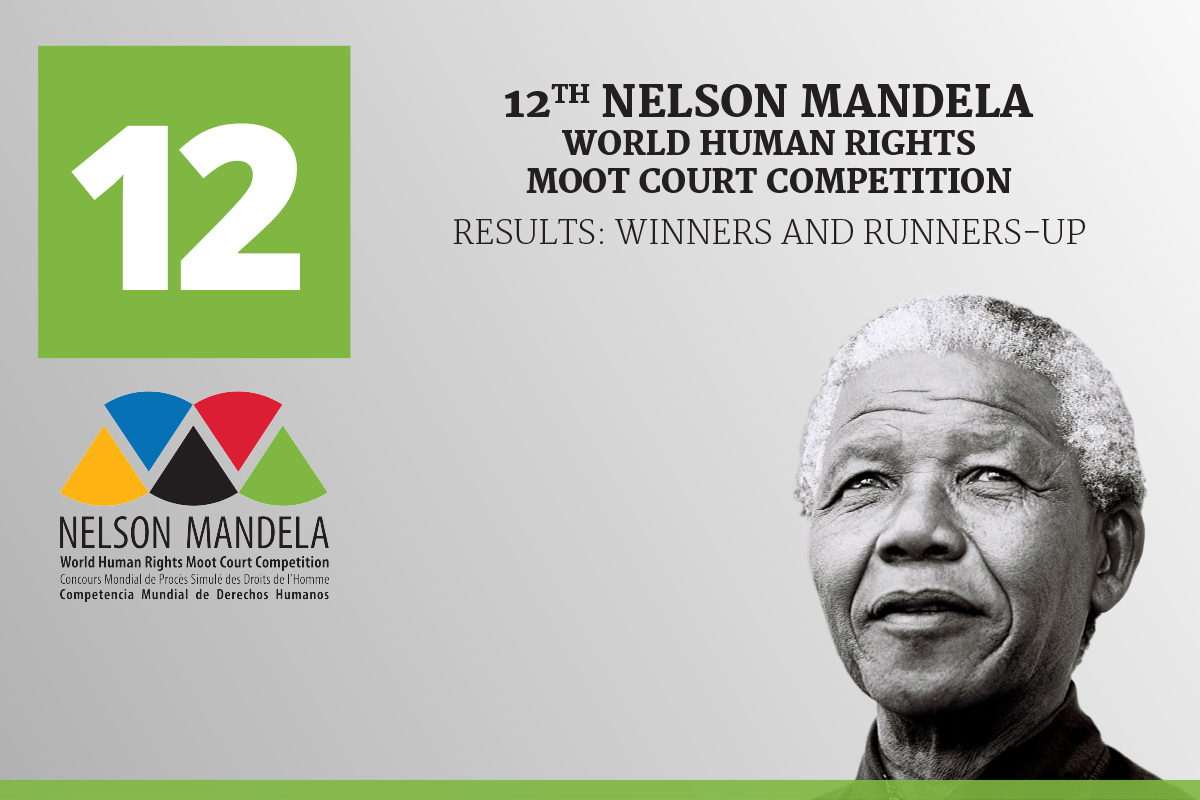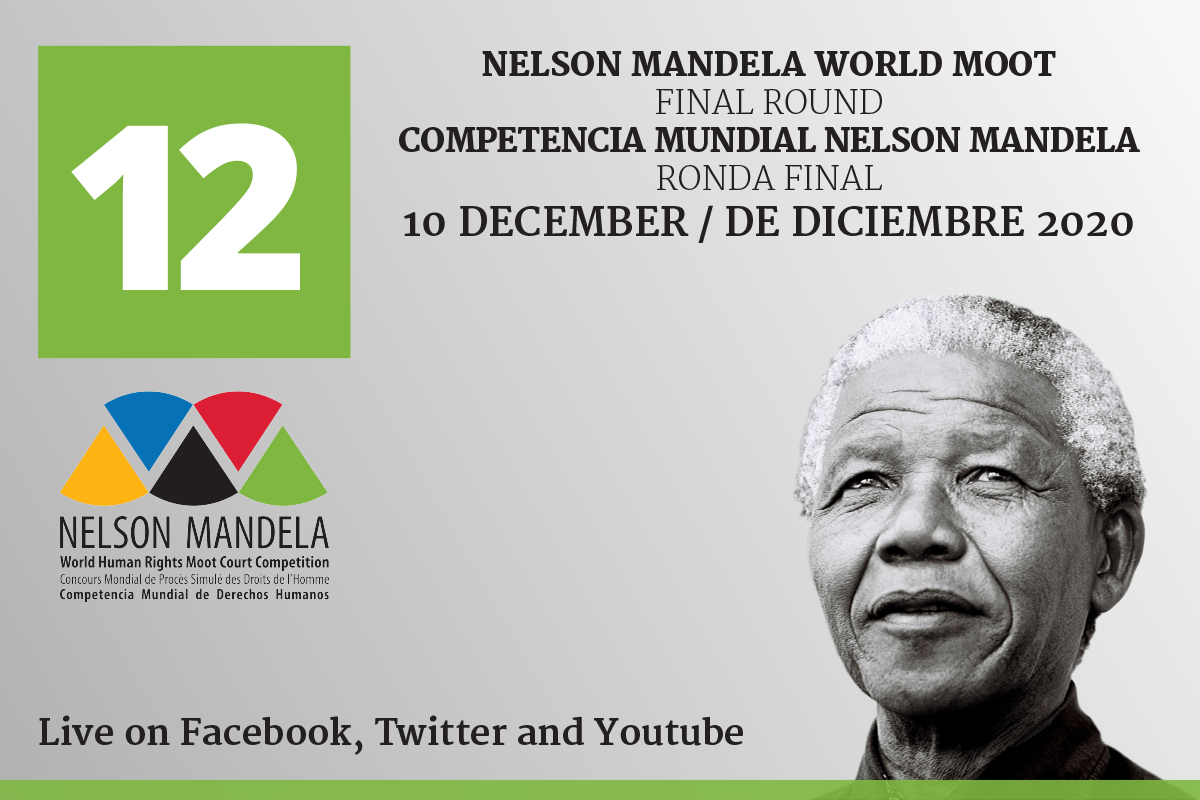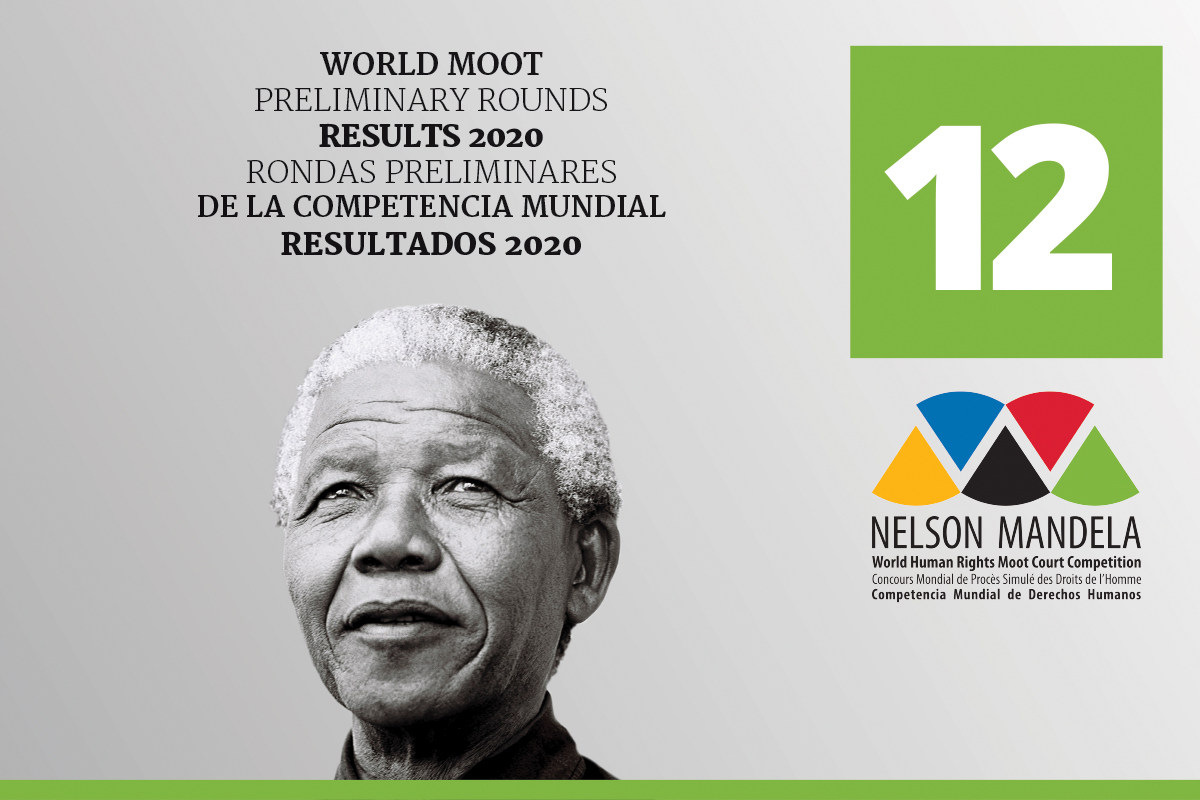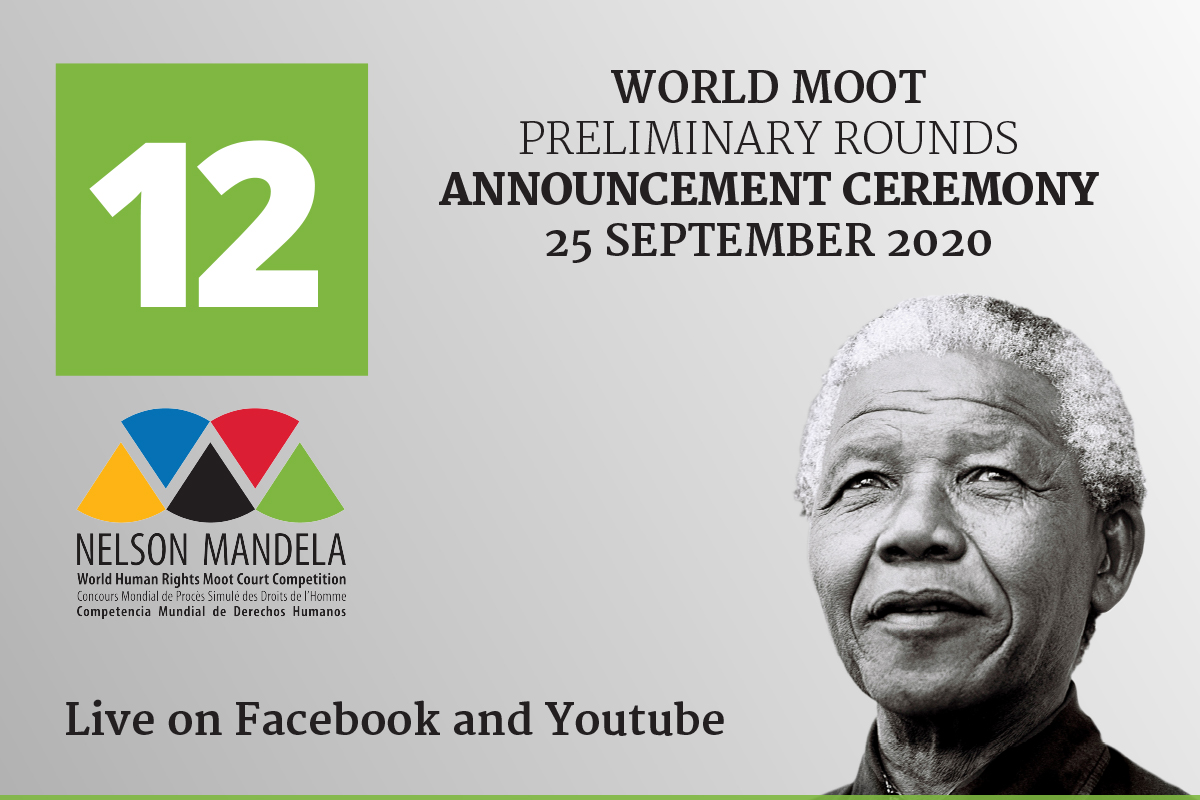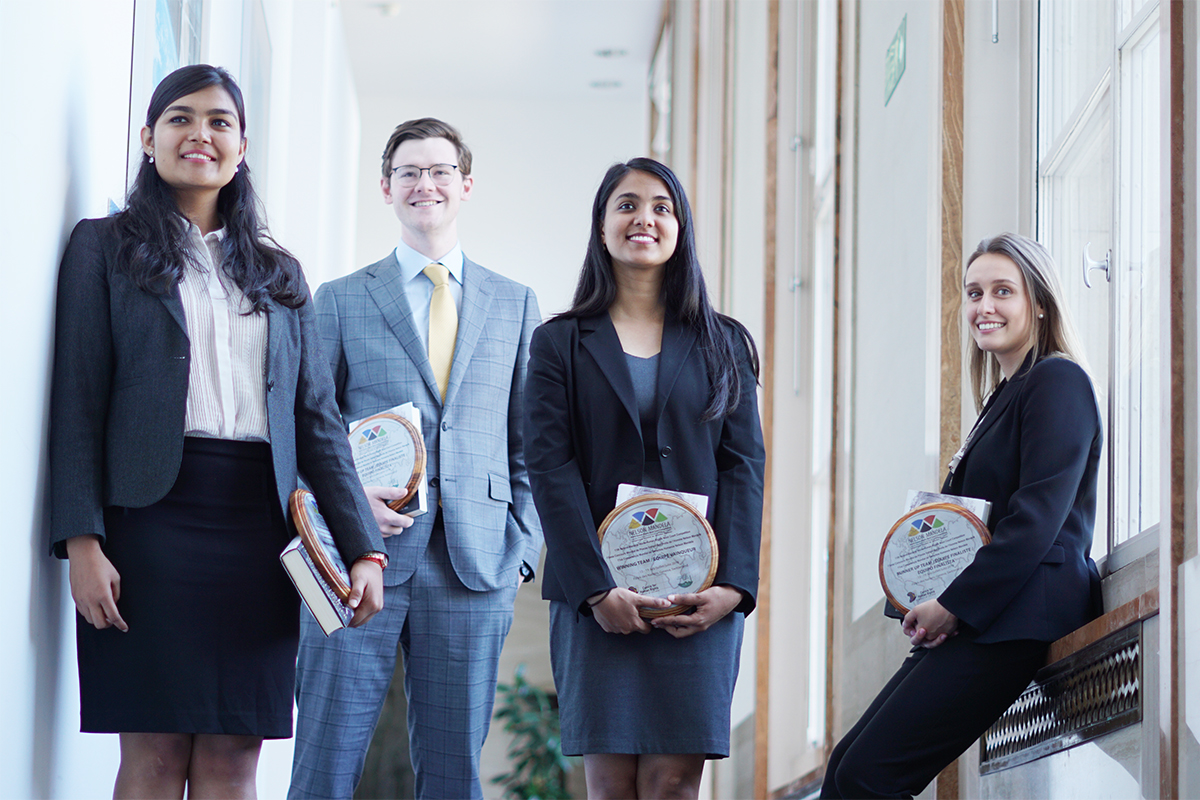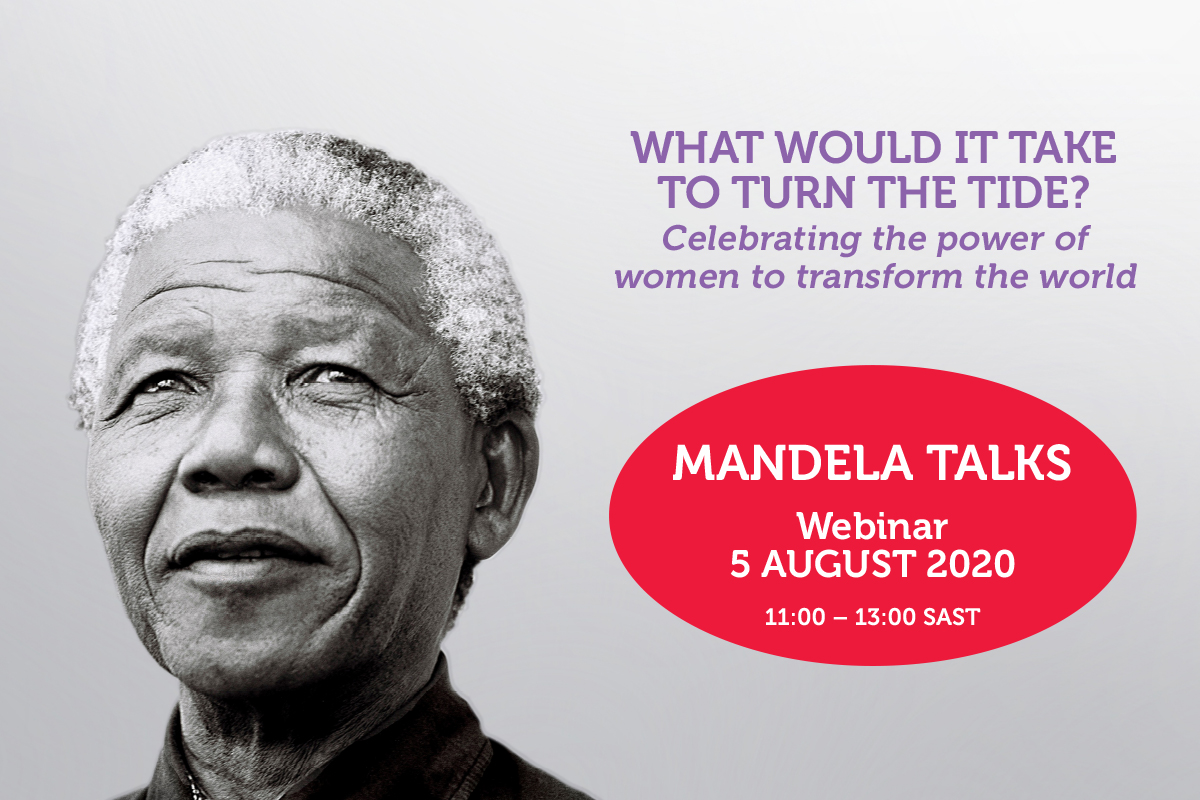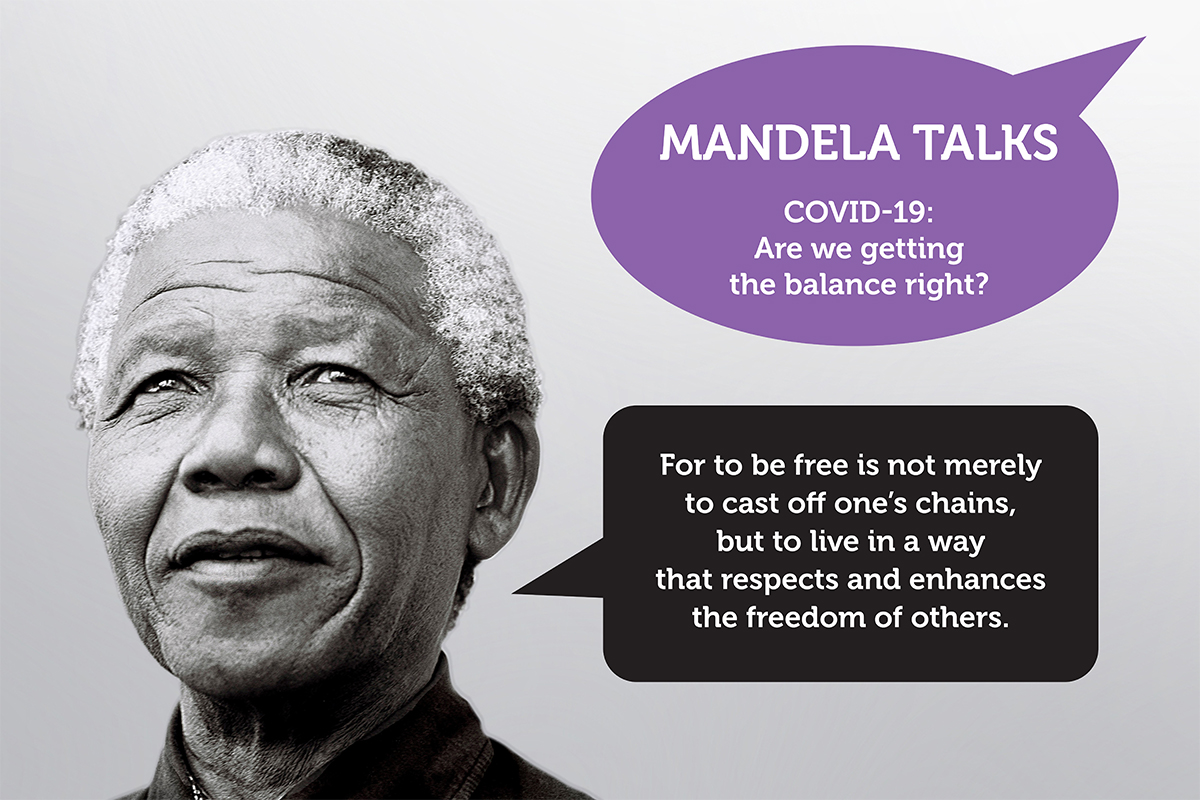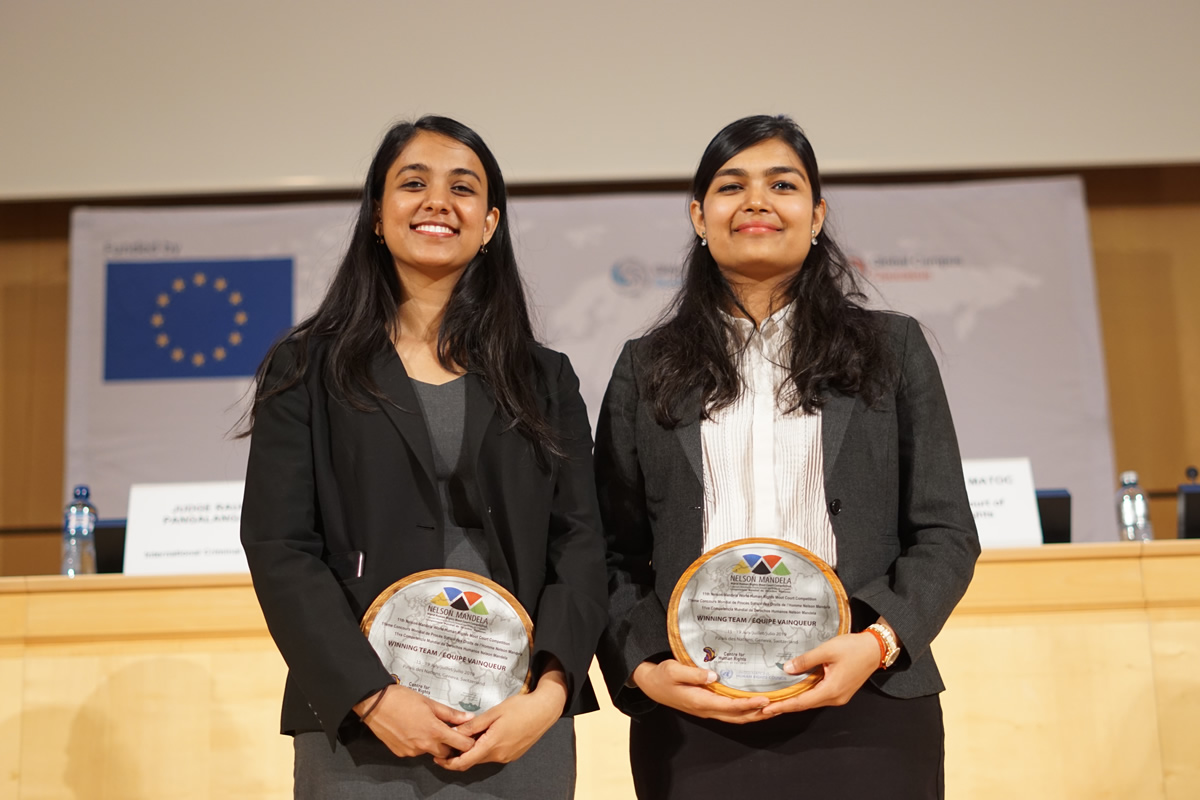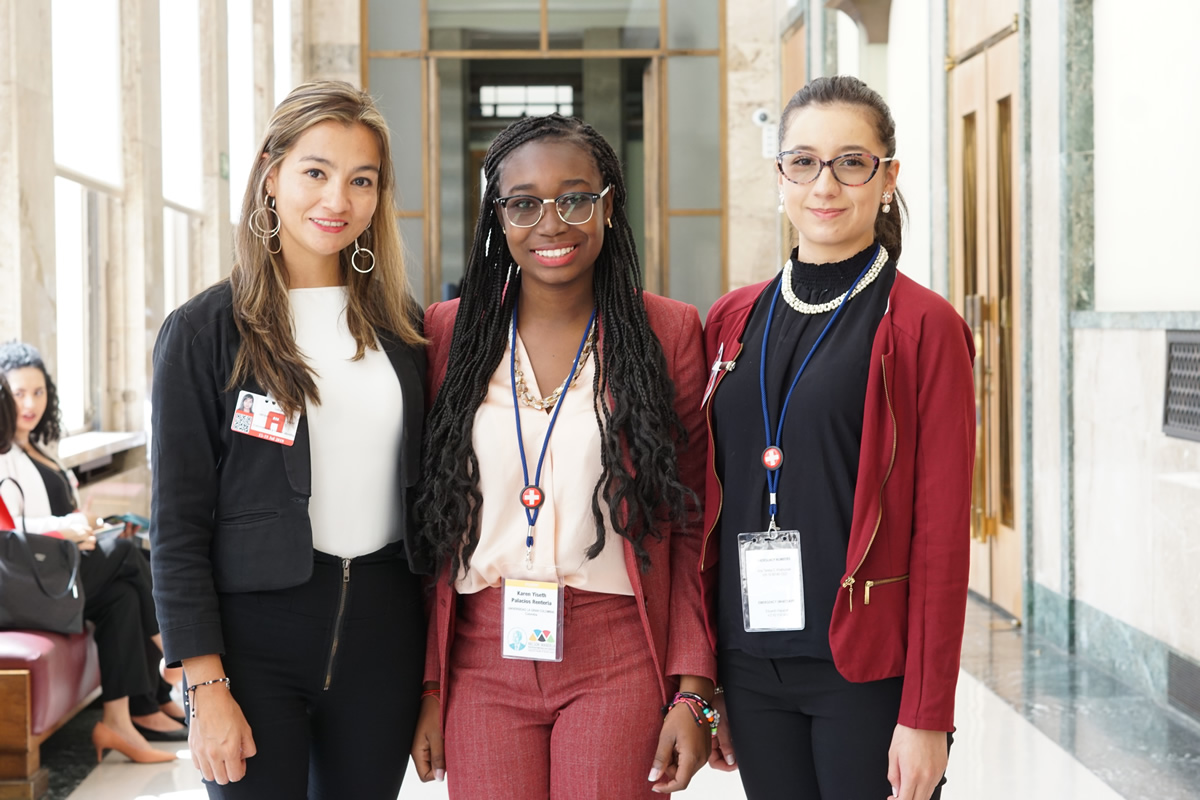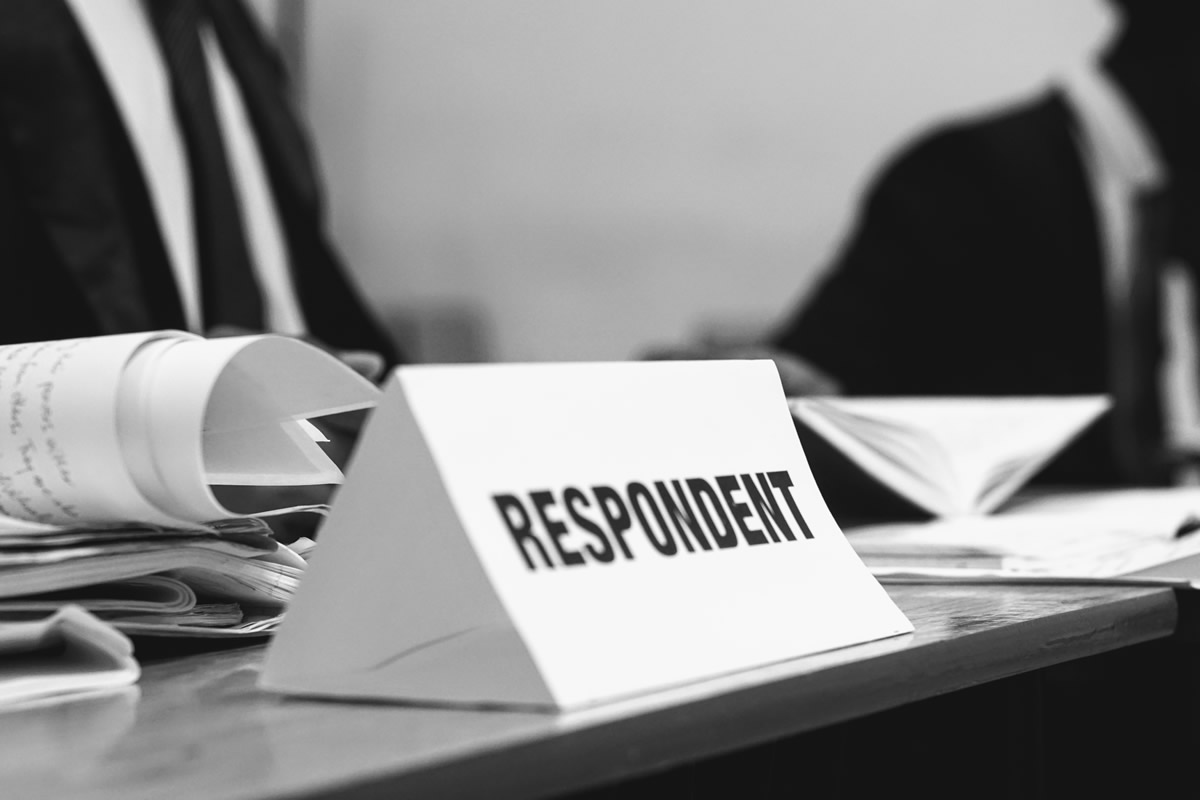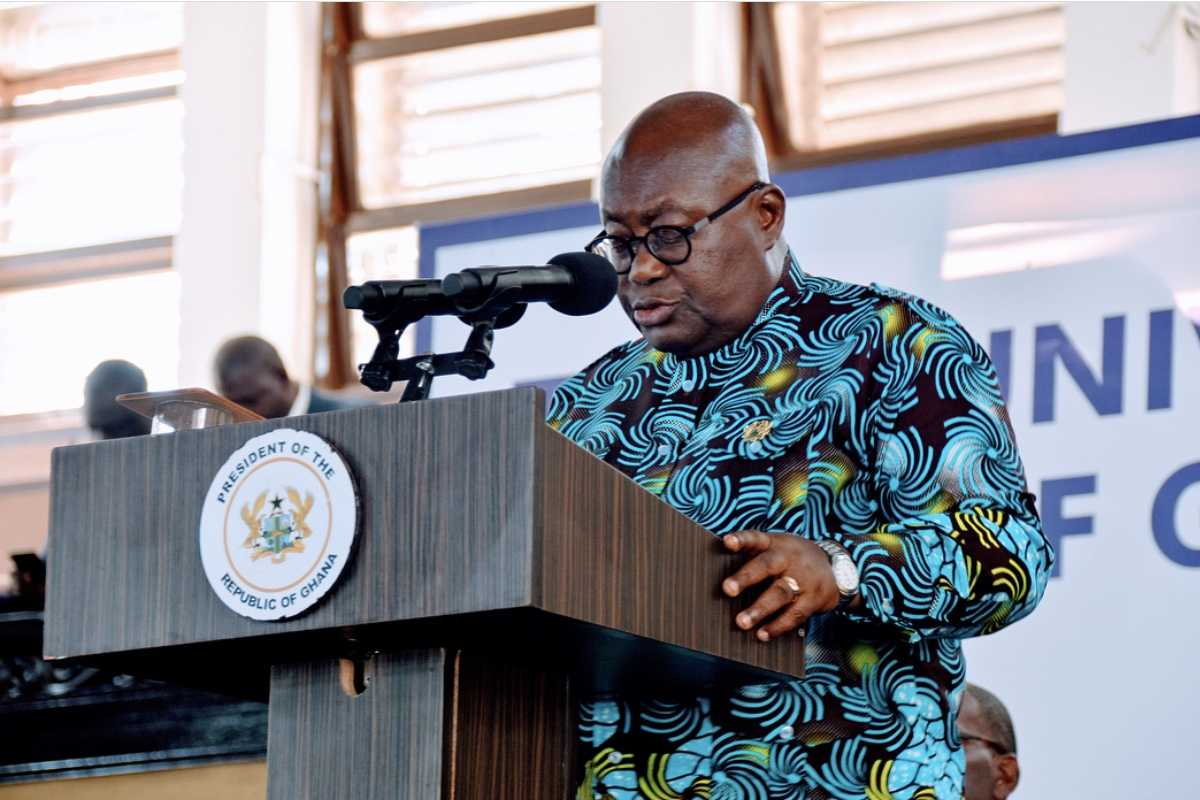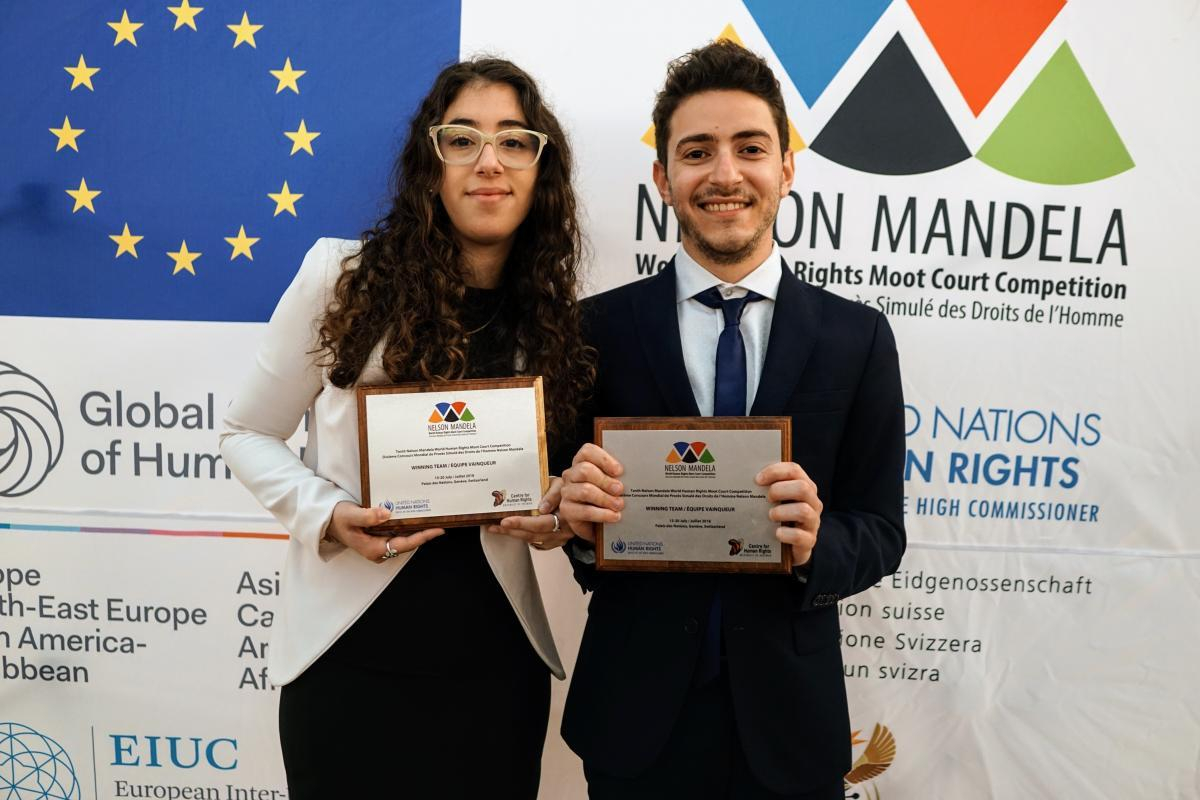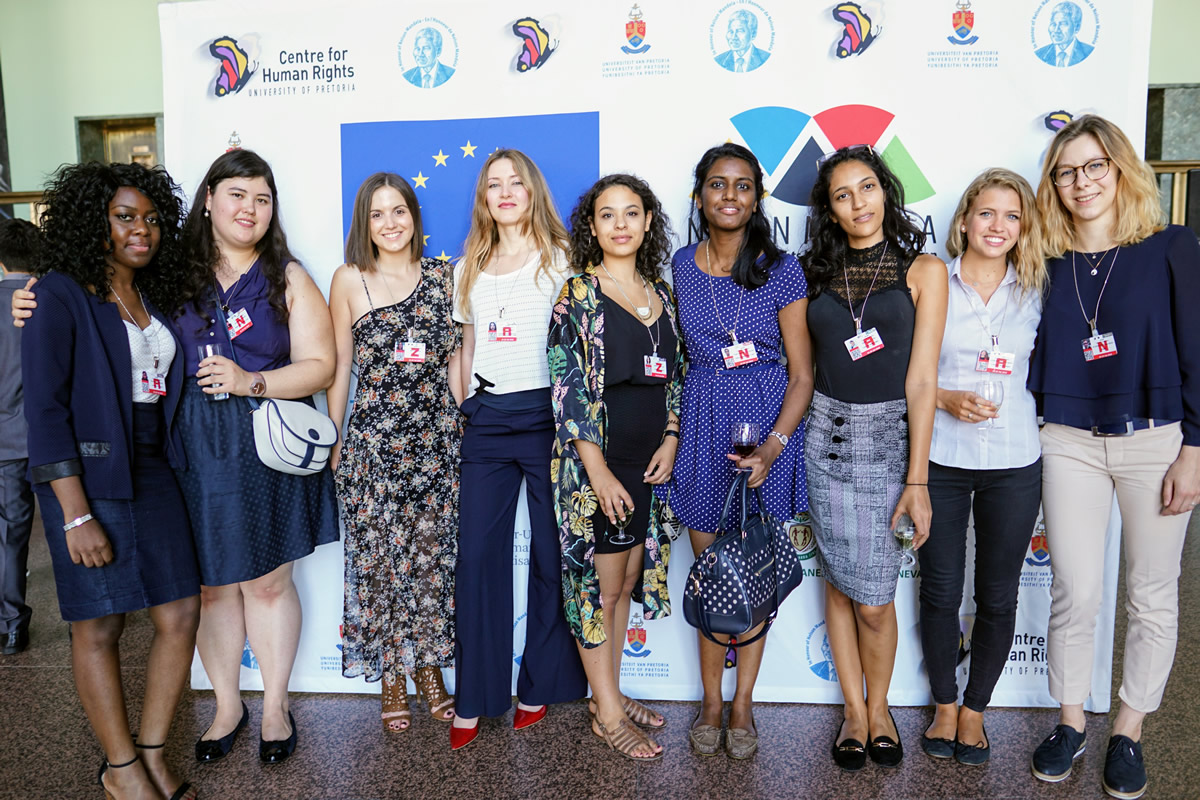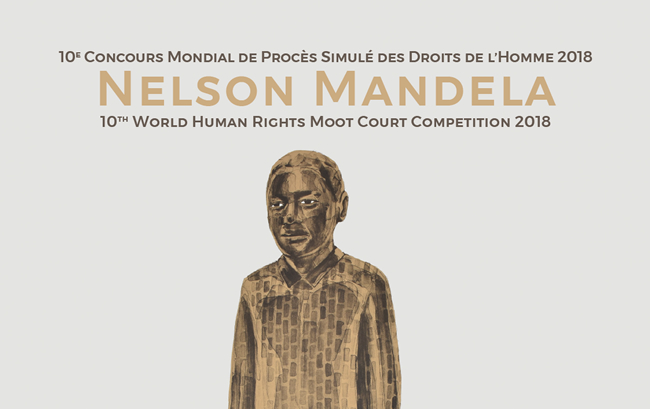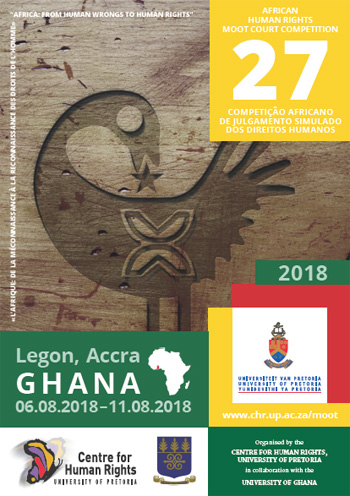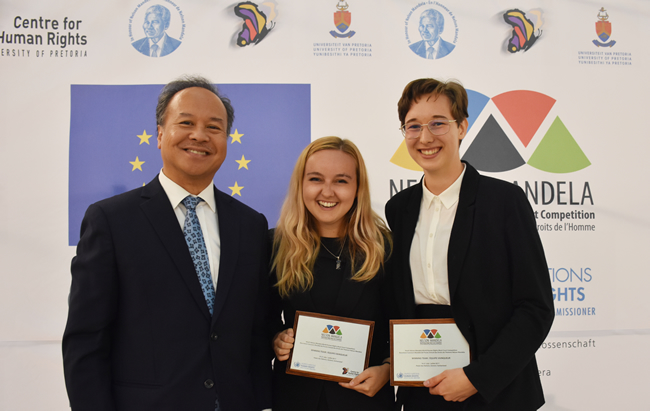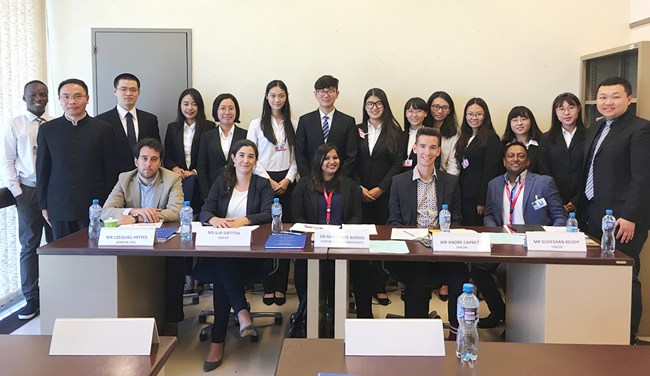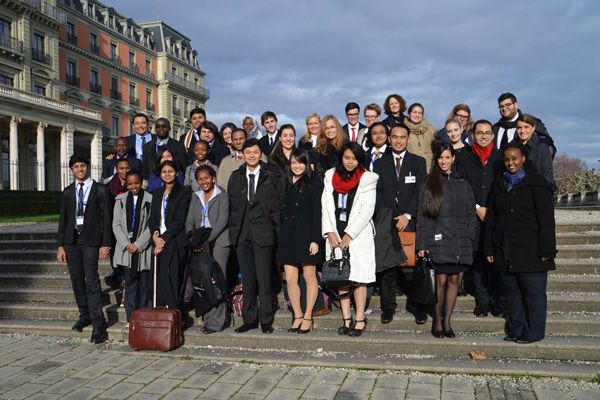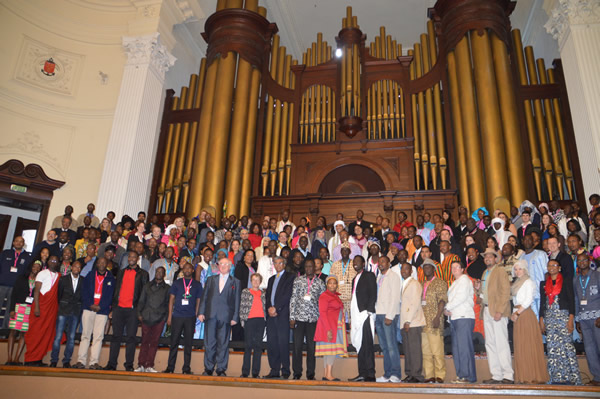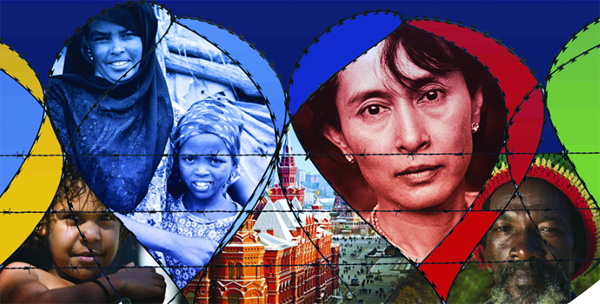- Details
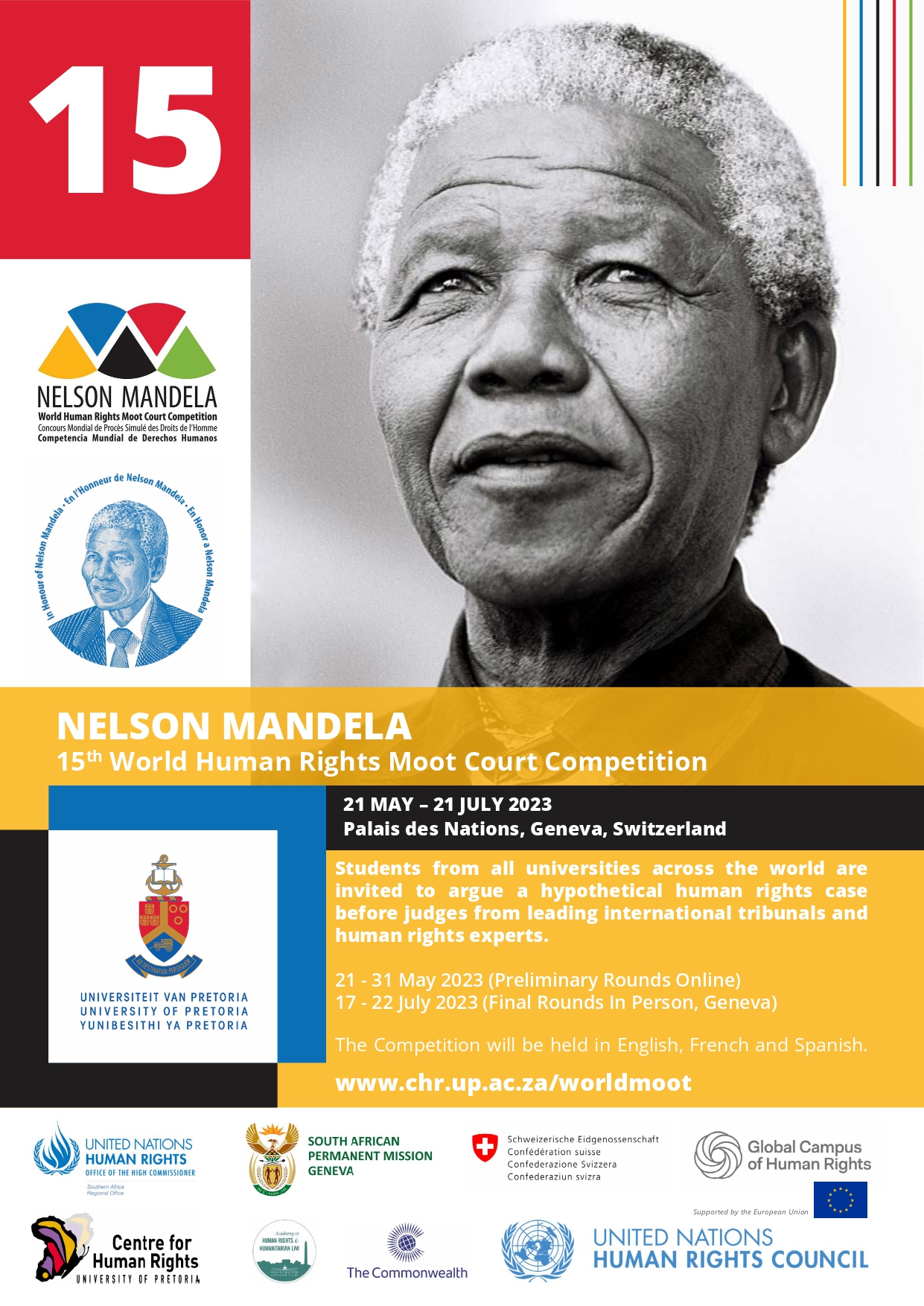 15th Nelson Mandela World Human Rights Moot Court Competition
15th Nelson Mandela World Human Rights Moot Court Competition
The Fifteenth Nelson Mandela World Human Rights Moot Court Competition adopted a hybrid format, with the in-person final rounds scheduled to take place at the Palais des Nations in Geneva, Switzerland from 17 – 21 July 2023 and the preliminary virtual rounds (online) scheduled to take place from 20 – 27 May 2023.
Documents 2023
Hypothetical case to be argued
Official rules
Clarification of Facts
Appendix A: Memorial Cover Page
Appendix B: Memorial Scoring Sheet
Appendix C: Instructions to Judges
Appendix D: Scoring Sheet
Winning Team
National University of Advanced Legal Studies, Kochi (India)
Winning team of the 2023 Nelson Mandela World Human Rights Moot Court Competition (from left, Akhila Vijayan and Aishwarya Sridhar)
Preliminary Rounds
All registered teams are required to submit written heads of arguments (memorials). These memorials are assessed, and the best teams from each of the 5 UN regions (the top 14 teams from Africa; 13 from Asia; 9 from Latin America and the Caribbean; 8 from the West European and Other; and 6 from East European states), are identified on the basis of the marks awarded for the written memorials. The best teams qualify to participate in the preliminary rounds.
- Details
The Centre for Human Rights, Faculty of Law, University of Pretoria, is delighted to announce the successful presentation of the 14th edition of the Nelson Mandela World Human Rights Moot Court Competition, which was held in a hybrid format. The team of Singapore Management University, Singapore, composed of Shu Yi Ling and Duncan Lim, claimed the title as 2022 winners. The runner up team is the Geneva Academy for International Humanitarian Law and Human Rights.
Ordinarily, the World Moot Court Competition, which focuses on the UN human rights treaties, takes place annually and fully in person at the Palais des Nations in Geneva, Switzerland. However, in light of the continued threat posed by the current global pandemic, the World Moot took place in a hybrid format. While the Moot ordinarily takes place around Nelson Mandela’s date of birth (18 July), the 2022 Competition saw the Preliminary Rounds spread out over a week, from 20 to 27 May 2022, with the Competition culminating in the Final Round on 21 July 2022. The Final Round took place in Room XX, the Human Rights and Alliance of Civilizations Room, at the UN European headquarters in Geneva, Switzerland. The UN Human Rights Council also holds its deliberations in this Room.
The two teams made it to the final round by advancing through two grueling preliminary and advanced rounds, surviving an intense quarter-final round, and emerging as winners in the semi-final rounds. The other semi-finalists were Geneva Academy for International Humanitarian Law and Human Rights (Switzerland) Singapore Management University (Singapore) and Symbiosis Law School, Pune (India). The Preliminary Rounds of the Competition took place separately in English and Spanish.
The Final Round was presided over by an esteemed panel of six judges from the European Court of Human Rights (Judge Ivana Jelic), the Inter-American Court of Human (Judge Veronica Gomez), the Supreme Court of Belize (Judge Genevieve Chabot) the Commonwealth Secretariat (Dr Shavana Haythornthwaite) the Global Campus of Human Rights (its Secretary General Professor Manfred Nowak) and the drafter of the hypothetical case Associate Professor Thompson Chengeta of the University of Liverpool. In 2022, Ms Ayushi Agarwal and Ms Gayathree Thazhatuveetil, winners of the 2019 Nelson Mandela World Human Rights Moot Court Competition, were also members of the judging panel.
In the spirit of the Moot Competition bringing the world together, this year’s edition had participants from 36 universities, from over 19 countries, representing the five UN regions and covering two language groups – English and Spanish.
The Nelson Mandela Moot Court Competition is organised annually by the Centre for Human Rights, together with the Academy on Human Rights and Humanitarian Law at the Washington College of Law, American University, Washington DC, and in collaboration with the Office of the High Commissioner for Human Rights in Geneva (Human Rights Council branch).
The Competition too place for the first time in 2009. Initially, it took place in Pretoria, at the University of Pretoria, but it had been presented in Geneva, Switzerland, from 2014 to 2019. Due to COVID-19 the 2020 and 2021 editions of the Moot Court were presented online while in 2022 the Competition adopted a hybrid format with the preliminary rounds taking place online from 20 to 27 May 2022 and the in person Final Rounds taking place from 18 to 21 July 2022.
The closing ceremony was well attended. The United Nations Deputy High Commissioner for Human Rights, Ms Nada Al Nashif, in her remarks congratulated participants for reaching the final round and celebrated all those who joined the Competition and commended participants for their interest and dedication to human rights. Ms Al Nashif added that World Moot participants form part of an “inspiring generation”.
The Director of the Centre for Human Rights, Professor Frans Viljoen, thanked everyone involved in organising the Moot. While emphasizing that it is a team effort, in particular of staff of the Centre for Human Rights, he highlighted the dedication and professionalism of the World Moot Court Coordinator, Dr Eduardo Kapapelo.
As part of the Nelson Mandela World Human Rights Moot Court Competition, the Third Annual Nelson Mandela Human Rights Lecture was held on 18 July 2022 at the University of Geneva. The United Nations Special Rapporteur on the promotion and protection of Human Rights in the context of Climate Change, Dr Ian Fry, led a panel discussion. The panel consisted of Dr Ashfaq Khalfan, Director of Climate Justice at Oxfam America, Ms Vanessa Nakate, Ugandan Youth Climate Activist and Ms Therese Arnesen, Human Rights Officer at the Office of the UN High Commissioner for Human Rights.
The panel, which focused on climate justice, reflected on the role of states, international institutions and people on the fight against climate change, the achievements in the field and continued challenges. The co-hosts of the lecture were the Geneva Academy for International and Humanitarian Law.
The Moot is made possible through the assistance of the European Union, through the Global Campus of Human Rights, and the government of Switzerland.
The Competition is unique in reaching a broad base of participants, including from those parts of the world where regional human rights systems have not been established, or have only been recently introduced.
Preliminary round teams
In 2022, the World Moot brought together the following participants during the Preliminary Rounds:
Africa Group
1. Botswana University of Botswana
2. Kenya Strathmore University
3. Kenya Kabarak University
4. Nigeria Lagos State University
5. Nigeria Ebonyi State University
6. Nigeria Mnamdi Azikiwe university, Awka
7. Nigeria University of Lagos
8. Nigeria University of Calabar
9. South Africa University of Fort Hare
10. South Africa University of Pretoria
Asia Pacific Group
1. China China University of Political Sciences and Law
2. Cambodia Royal University of Law and Management
3. Cambodia National University of Management
4. Bangladesh Chittagong Independent University
5. Bangladesh State university of Bangladesh
6. India Symbiosis Law School, Pune
7. India National Law Institute University, Bhopal
8. Malaysia University of Malaya
9. Singapore National University of Singapore
10. Singapore Singapore Management University
Latin America & Caribbean Group
1. Argentina University of Buenos Aires
2. Brazil State University of Bahia
3. Brazil Centro Universitario Curitiba (UNICURITIBA)
4. Brazil University of Sao Paulo
5. Peru Universidad Cesar Valleo
6. Ecuador Universidad Nacional del Santa
Western Europe & Others Group
1.Australia University of New South Wales
2. Australia University of New Castle
3. Australia Macquarie University
4. Germany Friedrich-Alexander - Universitat Erlangenn, Nuremberg
5. Canada St. Thomas University
6. Netherlands University College Roosevelt
7.Switzerland Geneva Academy of International Humanitarian Law and Human Rights
8. Turkey Koc University
9. United Kingdom Oxford University
10. United States of America US College of William and Mary
Eastern European Group
1. Belarus Belarusian State University
Memorials (written arguments) ranking
All registered teams are required to submit written arguments (memorials).
These memorials are assessed and serve as the basis on which 10 teams per UN region are selected for participation in the Preliminary Rounds.
Best Spanish-language memorials
1. Universidad Nacional del Santa (Peru)79%
2.Universidad Cesar Valleo (Peru)68%
Best English-language memorials
1. University of Oxford (United Kingdom) 91.2%
2. University of Pretoria (South Africa ) 91%
3. University of Buenos Aires (Argentina) 89%
4. Centro Universitário Curitiba (UNICURITIBA) (Brazil) 88%
5. University of Fort Hare (South Africa) 87.5%
6. University of Calabar (Nigeria) 86.5%
7. Koc University (Turkey) 85%
8. University of Botswana (Botswana) 85.5%
9. Kabarak Univeristy (Kenya)84.5%
10. University of New South Wales (Australia) 83%
Best teams in the preliminary rounds
Top team in the Spanish-language Preliminary Rounds
1. Universidad Nacional del Santa (Peru) 79%
Top ten teams in the English-language Preliminary Rounds
1. University of Oxford (United Kingdom) 93.55%
2.University of Buenos Aires (Argentina) 89.57%
3. Kabarak University (Kenya) 87.90%
4.Symbiosis School of Law, Pune (India) 86.67%
5. University of New South Wales (Australia) 86.50%
6. Singapore Management University (Singapore)85.95%
7. Geneva Academy of International Humanitarian Law and Human Rights (Switzerland) 84.63%
8. St. Thomas University (Canada) 84.30%
9. University of Pretoria (South Africa)83.40%
10. Koc University (Turkey) 83.25%
Quarter-finalists
1.Geneva Academy for International and Humanitarian Law (Switzerland)
2. Singapore Management University (Singapore)
3. University of Oxford (United Kingdom)
4. Symbiosis Law School (India)
5. Kabarak University (Kenya)
6. St. Thomas University (Canada)
7. University of Buenos Aires (Argentina)
8. University of New South Wales (Australia)
Semi-finalists
1.Geneva Academy for International and Humanitarian Law (Switzerland)
2.Singapore Management University (Singapore)
3.University of Oxford (United Kingdom)
4. Symbiosis Law School (India)
Finalists
1.Geneva Academy for International and Humanitarian Law (Switzerland)
2.Singapore Management University (Singapore)
Winning team
Singapore Management University (Singapore)
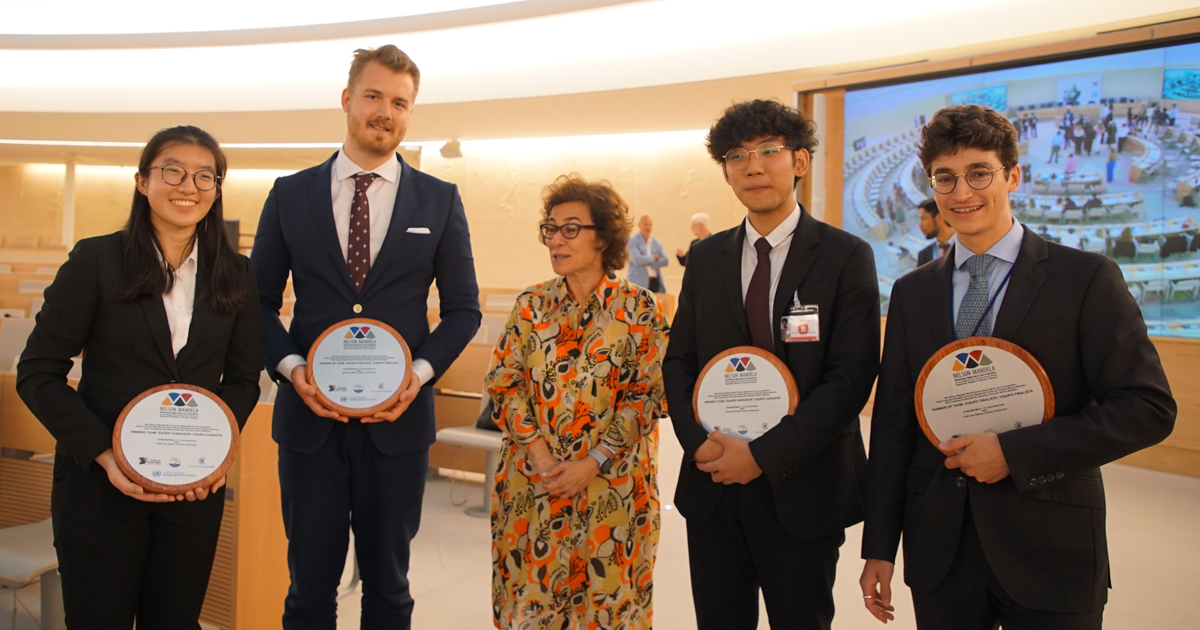
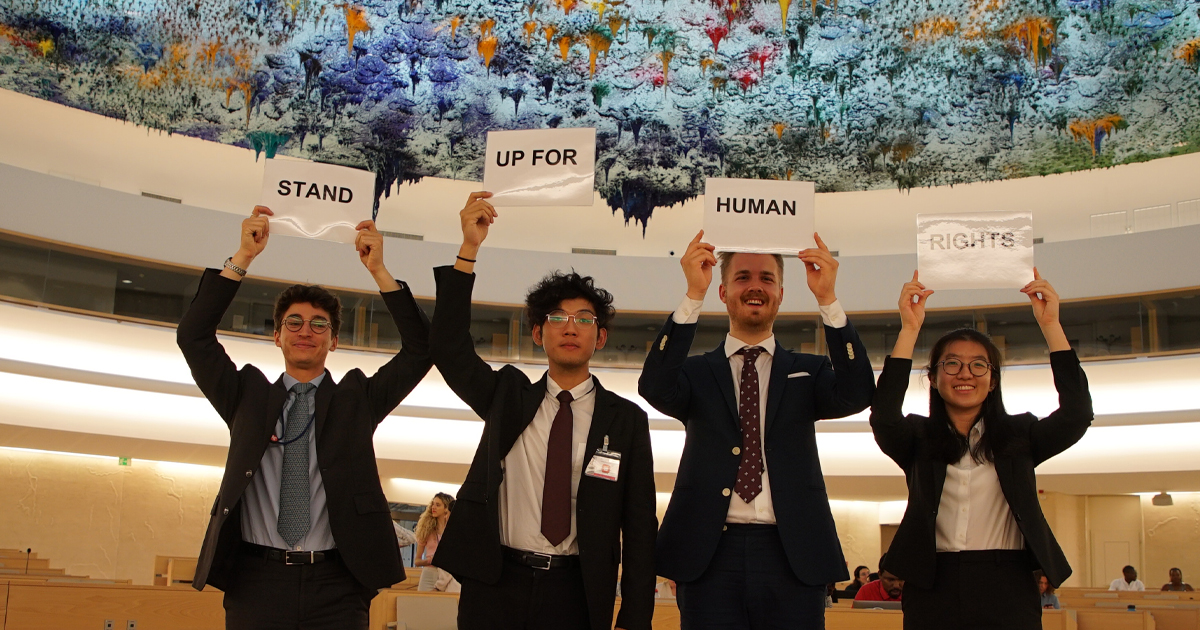
- Details
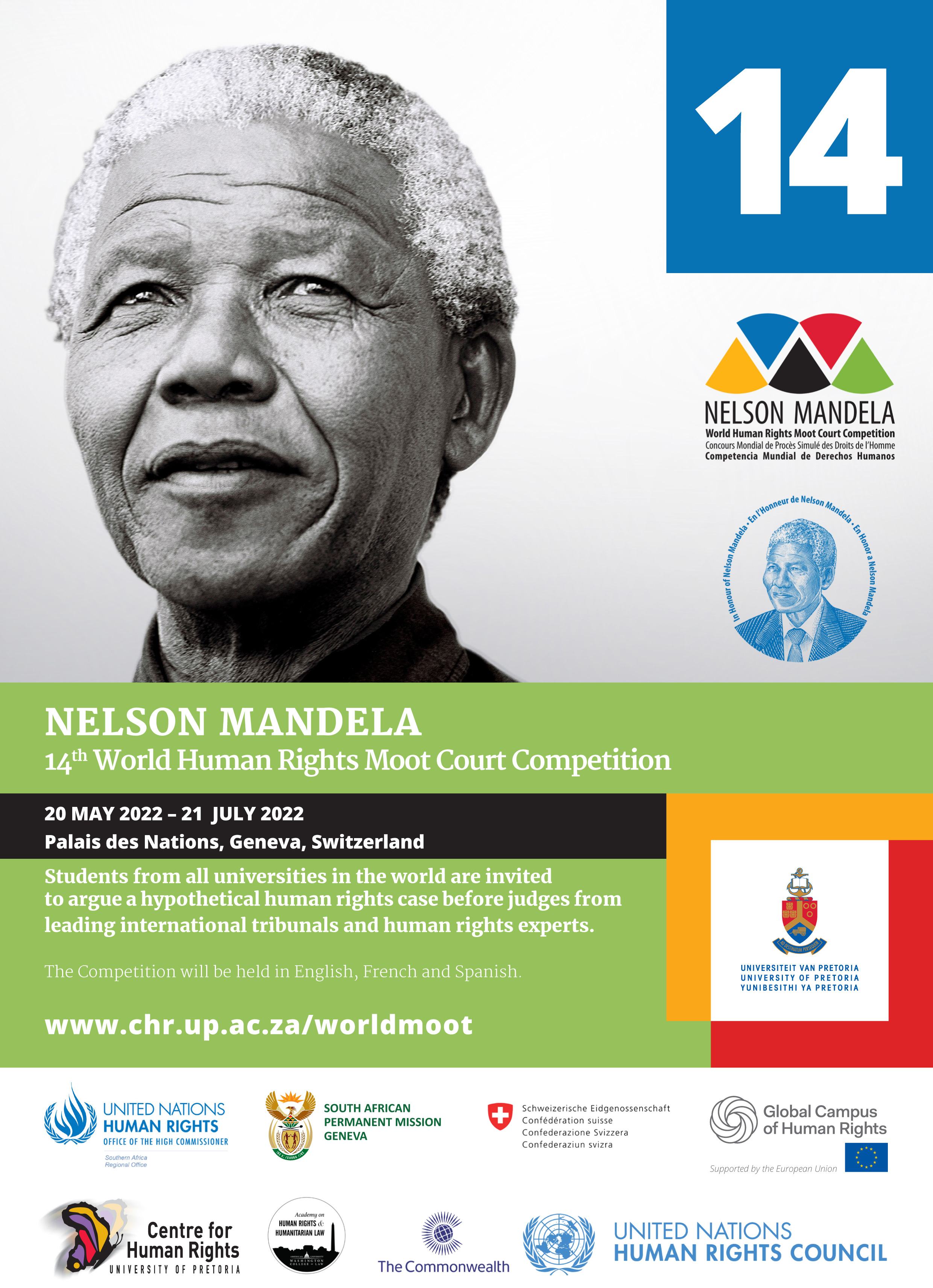
14th Nelson Mandela World Human Rights Moot Court Competition
The sixteen teams that qualified for the in-person rounds in Geneva are – in alphabetical order - the following universities:
Africa Group
- Kenya - Kabarak University
- Nigeria - Ebonyi State University
- South Africa - University of Pretoria
Asia Pacific Group
- India - National Law Institute University, Bhopal,
- India - Symbiosis School of law, Pune
- Malaysia - University of Malaya
- Singapore - Singapore Management University
Latin America & Caribbean Group
- Argentina - University of Buenos Aires
Western Europe & Others Group
- Australia - University of New South Wales
- Australia - Mcquire University
- Canada - St Thomas University
- Netherlands - University College Roosevelt
- Switzerland - Geneva Academy of International Humanitarian Law and Human Rights
- Turkey Koc - University
- United Kingdom - University of Oxford
Eastern European Group
- Belarus - Belarusian State University
For more information, please contact:
- Details
For the first time since in its 12-year history, the Nelson Mandela World Human Rights Moot Court Competition was wholly held online. The team of Strathmore University, Kenya, consisting of Mariam Malik and Eugene Kanyugo, claimed the title as 2020 winners. The runner-up team is Kenyatta University, also from Kenya.
- Details
For the first time, the Nelson Mandela World Human Rights Moot Court Competition has taken place virtually in 2020.
- Details
This year's Nelson Mandela World Human Rights Moot Court Competition saw 44 teams (39 English-language and 5 Spanish-language teams) participating for the coveted eight quarter-finalists positions places. Although the Competition is open to French-language teams, regrettably, only two teams submitted its memorials (Ecole Superieure des sciences de Pierre Elliot Trudeau (Esseget) and Catholic University of Bakavu).
- Details
The first phase of the 2020 Nelson Mandela World Human Rights Moot Court Competition has been completed. From 19 to 23 September 2020, the preliminary rounds of the World Moot Court Competition for the first time ever took place virtually. Forty-three teams from all five United Nations regions participated in these rounds, which took place in English and Spanish.
- Details
The preliminary oral rounds of the 12th Nelson Mandela World Human Rights Competition will be held online from 19 to 23 September 2020. The World Moot is presented by the Centre for Human Rights, Faculty of Law, University of Pretoria, in partnership with the Academy on Human Rights and Humanitarian Law, Washington College of Law, American University and the United Nations Human Rights Council Branch (HRCB) at the Office of the High Commissioner for Human Rights (OHCHR).
- Details
This webinar hosted jointly by the Centre for Human Rights, University of Pretoria, the Leading Like Mandela Institute, the Thembekile Mandela Foundation and the United Nations, in a series of online “Mandela Talks” honours these legacies, celebrates the power of women to rise above adversity in creating a better world and remembers the indomitable spirit of Zindzi Mandela, a great daughter of the nation.
- Details
As part of Mandela Month, during which we remember the birth date of Nelson Rolihlahla Mandela on 18 July 1918, the Centre for Human Rights, Faculty of Law, University of Pretoria, in collaboration with Leading Like Mandela Institute and the Thembekile Mandela Foundation, hosted the first in a series of online Mandela Talks.
- Details
The team from the University of Oxford has claimed the title as winners of the 11th Nelson Mandela World Human Rights Moot Court Competition, on 19 July 2019. Gayathree Devi KT and Ayushi Agarwal who represented the University of Oxford went up against co-finalists Nathan Ricardo and Nessa Salvador of Macquarie University from Australia. The Moot Court Competition, which focused on the UN human rights treaties, takes place annually at the Palais des Nations in Geneva, Switzerland.
- Details
The 11th Nelson Mandela World Human Rights Moot Court Competition is underway at the human rights capital of the world – Geneva, Switzerland.
- Details
After an illustrious opening ceremony, the first two sessions of the preliminary rounds of the African Human Rights Moot Court Competition started at the University of Ghana’s School of Law on 7 August 2018. The preliminary rounds involve all participating teams arguing the hypothetical case four times: twice for the Applicants, and twice as Respondent (the State).
- Details
The 27th edition of the African Human Rights Moot Court Competition started on an illustrious note, on 6 August 2018, at the University of Ghana, Accra, when H.E Nana Akufo-Addo, the President of Ghana officially opened the event.
The African Human Rights Moot Court Competition remains one of the largest gatherings of students, academics and judges around the theme of human rights in Africa. As in the past 27 years of the African Moot Court Competition, the Moot has brought together teams from all over the African continent – this year, there are 48 teams from 15 African countries.
- Details
Coinciding with the birth date of Nelson Mandela 100 years ago, the Nelson Mandela World Human Rights Moot Court Competition was held at the United Nations headquarters in Geneva, Switzerland. The University of Buenos Aires in Argentina emerged as winners, and the St. Thomas University in Canada, as runners-up in the final round of the competition.
A total number of 39 universities representing 24 countries from the 5 United Nations regions participated in the pre-final oral rounds of the competition, held in the human rights capital of the world. The Centre for Human Rights, University of Pretoria, annually organises this event, in collaboration with the United Nations Office of the High Commissioner for Human Rights. This year marked the tenth time the competition took place.
- Details
The 10th edition of the Nelson Mandela World Human Rights Moot Court Competition is currently holding at the human rights capital of the world – Geneva, Switzerland. The 39 teams that are competing this year at the Palais des Nations made it after an initial round of regional contest across the 5 UN regions. Brazil has six universities at this year’s World moot which is the largest number from any country. India is next with 4 universities. While Kenya and Ukraine have 3 universities each.
This year’s moot is especially significant because not only does it mark the tenth year of the competition, it also coincides with the centenary celebration of the great Nelson Mandela – the man whom the moot is named after.
- Details
Students from all universities in the world are invited to participate in the prestigious Nelson Mandela World Human Rights Moot Court Competition in 2018. Les étudiants de toutes les universités du monde sont invités à participer au prestigieux Concours Mondial de Procès Simulé des Droits de l’Homme Nelson Mandela de 2018.
Invitations in all six of the official UN languages
![]() Invitation letter (English)
Invitation letter (English)![]() Invitation letter (French)
Invitation letter (French)![]() Invitation letter (Spanish)
Invitation letter (Spanish)![]() Invitation letter (Arabic)
Invitation letter (Arabic)![]() Invitation letter (Russian)
Invitation letter (Russian)![]() Invitation letter (Chinese)
Invitation letter (Chinese)
- Details
The African Human Rights Moot Court Competition is the largest gathering of students, academics and judges around the theme of human rights in Africa. This annual event brings together all law faculties in Africa, whose top students argue a hypothetical human rights case as if they were before the African Court on Human and Peoples’ Rights.
The Competition continuously prepares new generations of lawyers to argue cases of alleged human rights violations before the African Court.
Since its creation in 1992, 150 universities from 50 African countries have taken part in this permanent fixture on the Africa legal education calendar. The Moot has been a catalyst for the establishment of the leading programmes in the field of human rights teaching and research in Africa.
- Details
The 9th Nelson Mandela World Human Rights Moot Court Competition concluded with the final round on 21 July 2017 at the Palais des Nations in geneva, Switzerland.
- The winning team of the 9th Nelson Mandela World Human Rights Moot Court Competition is the team that argued the case for the Applicant / Respondent, with 79.5%
The winning team from St Thomas University, Canada was represented by Abbie LeBlanc and Navy Vezina.
- The runner-up team of the 9th Nelson Mandela World Human Rights Moot Court Competition is the team that argued the case for the Applicant / Respondent, with 77.67 %.
The runner-up team from University of buenos Aires, Argenitina was represented by Carolina Lisandro Elias and Tomas Maria Ainchill.
- Details
The 9th Nelson Mandela World Human Rights Moot Court Competition is currently underway at the Palais des Nations, United Nations Geneva headquarters. After the submission of written memorials, 36 teams from 23 countries coming from the 5 United Nations regions progressed to the pre-final rounds that are held annually in the human rights capital of the world.
- Details
The Centre is delighted to announce the successful presentation of the 8th edition of the Nelson Mandela World Human Rights Moot Court Competition, which was held at Palais des Nations – the seat of the United Nations Office in Geneva – from 18 to 20 July 2016.
The Nelson Mandela World Human Rights Moot Court Competition has been presented every year for the last 8 years, bringing together some of the youngest and brightest law students from universities all around the globe to debate burning contemporary human rights issues on the basis of a common UN human rights system, influenced by national and regional perspectives and experiences. The Competition is unique in reaching a broad base of participants, including from those parts of the world where regional human rights systems have not been established, or have only been recently introduced.
- Details
The Sixth Nelson Mandela World Human Rights Moot Court Competition will be held from 8 to 10 December 2014, at Palais des Nations in Geneva, and will bring together 45 participants from 15
universities in 12 countries, representing all 5 United Nations regions of the world.
Teams from universities in the following countries have qualified to participate in the final round of the 6th World Human Rights Moot Court Competition, which will for the first time be called the Nelson Mandela World Human Rights Moot Court Competition: Argentina, Australia, Belarus, Greece, India, Indonesia, Kenya, Singapore, Slovenia, Poland, Switzerland and South Africa.
- Details
The twenty-second African Human Rights Moot Court competition, hosted by the University of the Western Cape marks not only the 22nd year that this competition has been running, but also the twentieth year since the creation and implementation of South Africa’s interim constitution. The competition aims to bring together human rights lawyers from every corner of the African continent and aspires to create awareness and informed individuals that will use their skills and knowledge to the betterment of the continent.
- Details
On the 7th of December 2012 the 4th edition of the World Moot Court Competition began with an exciting and eventful opening ceremony in which the participants expressed their diversity by dressing in their respective countries’ traditional dress. Sixteen teams from the five UN regions were invited to attend the Competition.
After arriving at the university the students registered for the competition where after they attended the opening ceremony in which Professor Frans Viljoen welcomed the students and introduced Mr Marco Kalbusch from the Office of the High Commissioner for Human Rights who was the keynote speaker for the evening. Mr Kalbusch, as well as Professor Frans Viljoen, addressed the students and provided some words of encouragement to the students before embarking on their journey towards the final of the competition. The evening drew to a close after a lovely dinner where all the participants and organisers had a chance to socialise and become more acquainted with each other.

